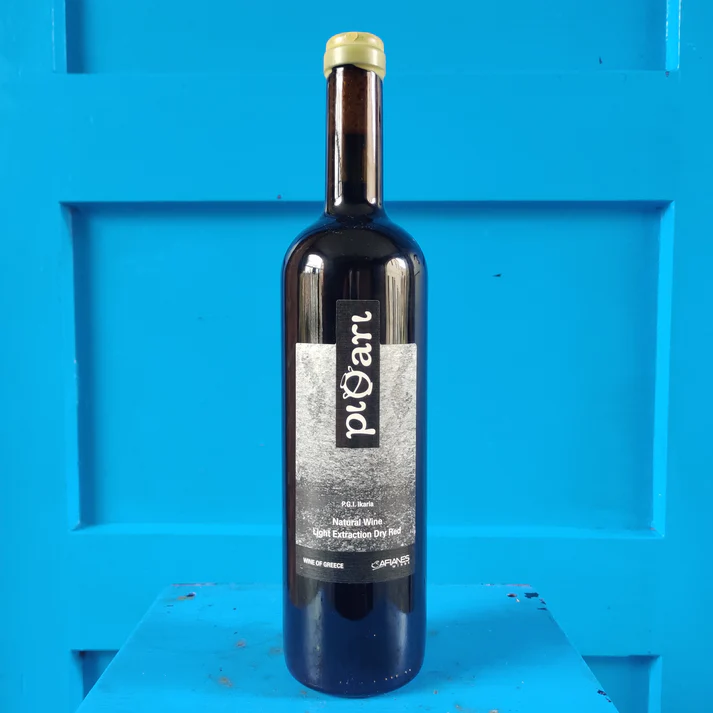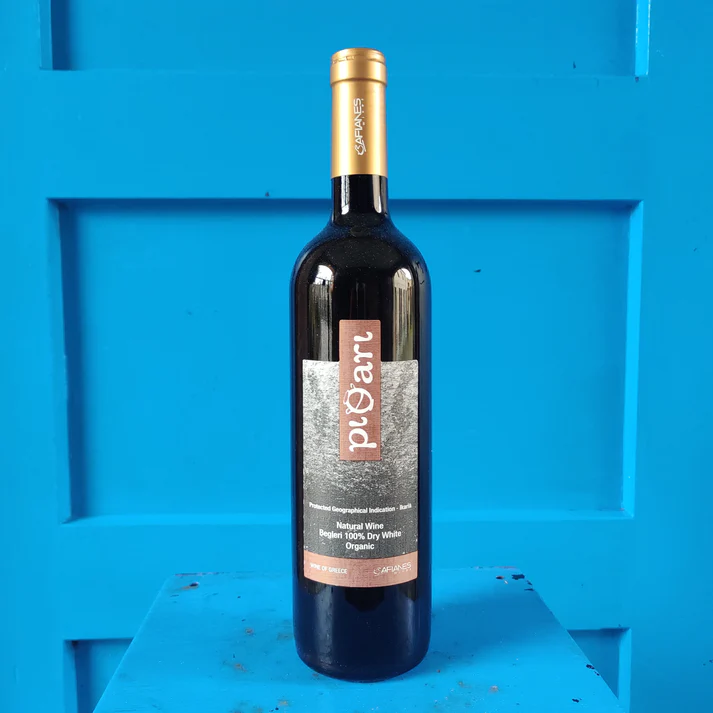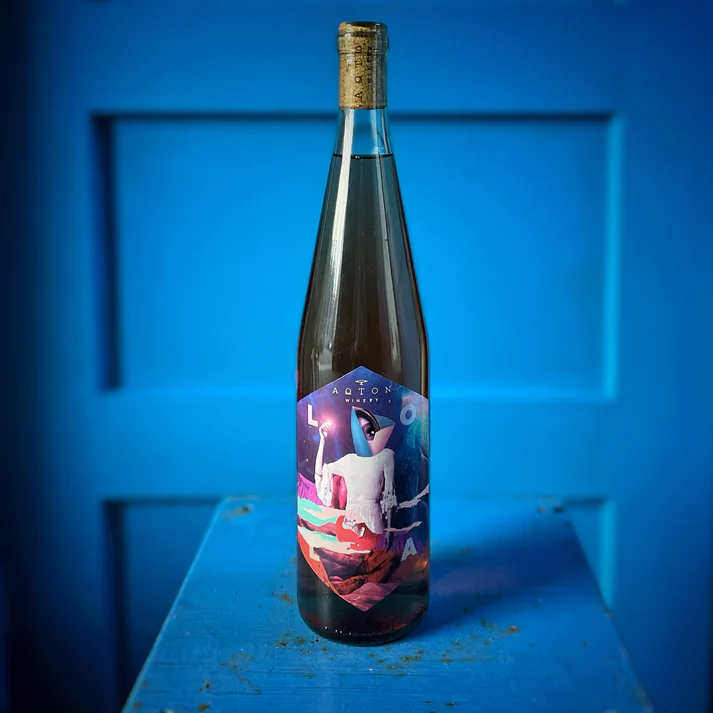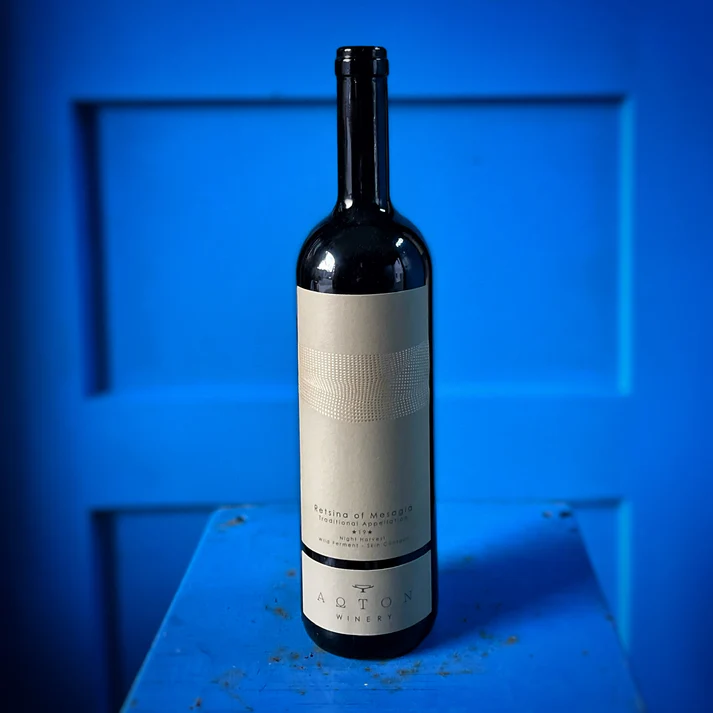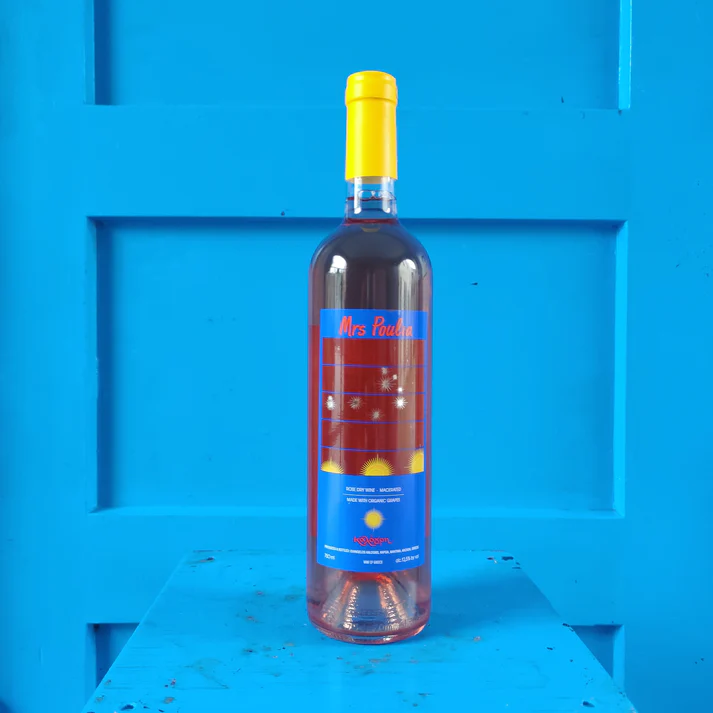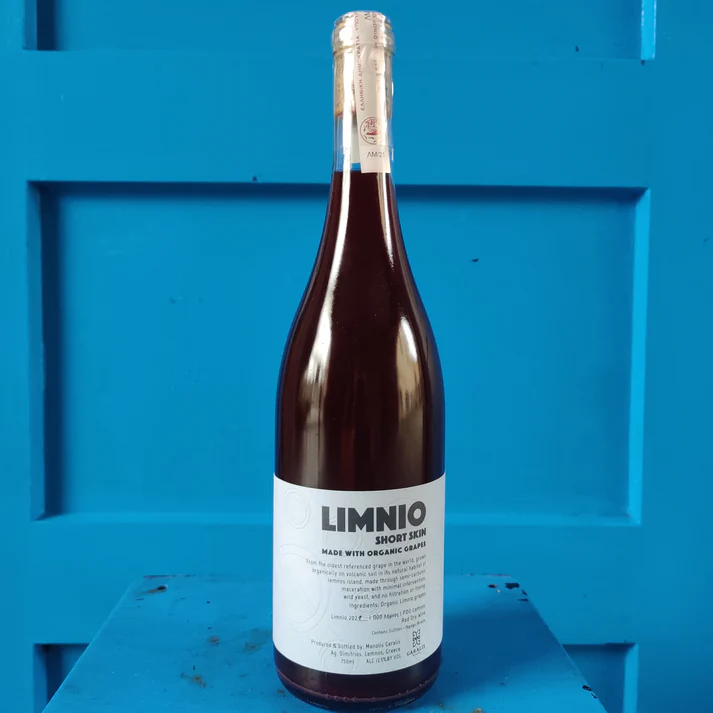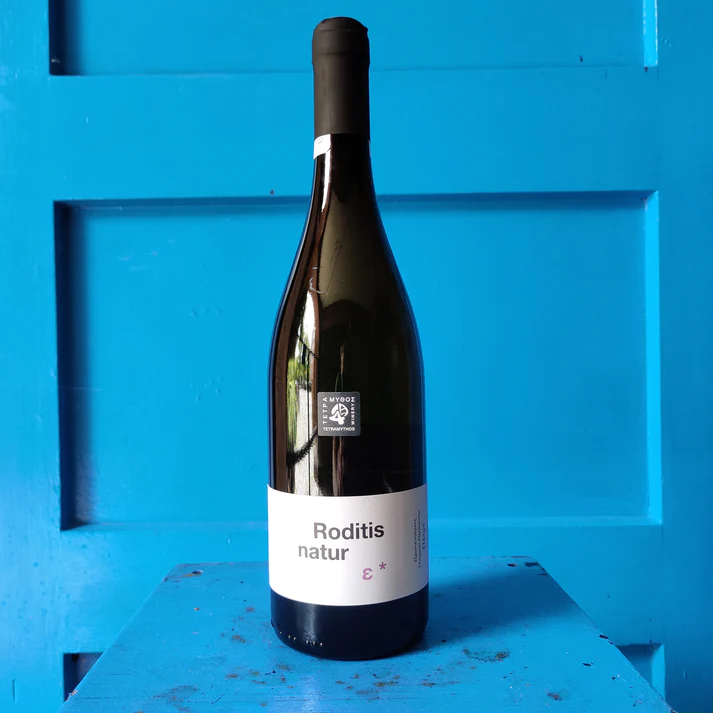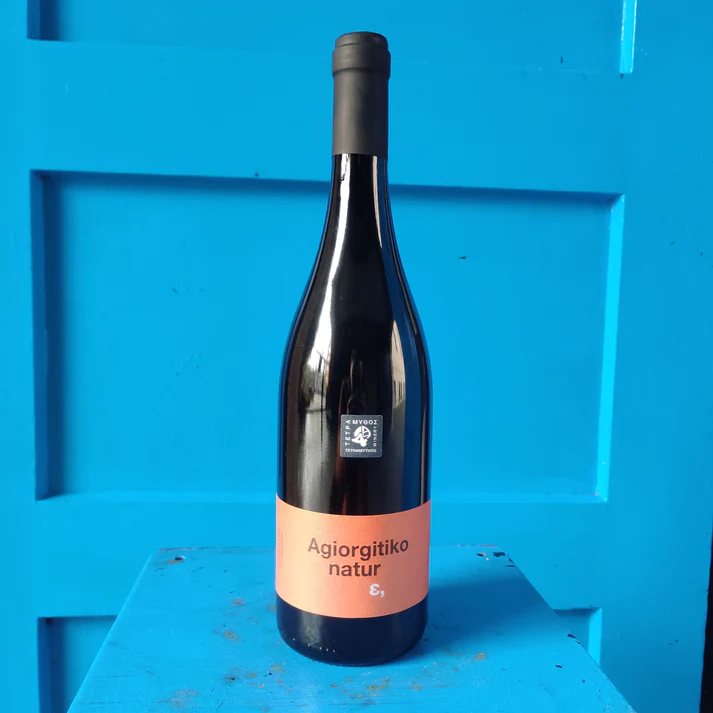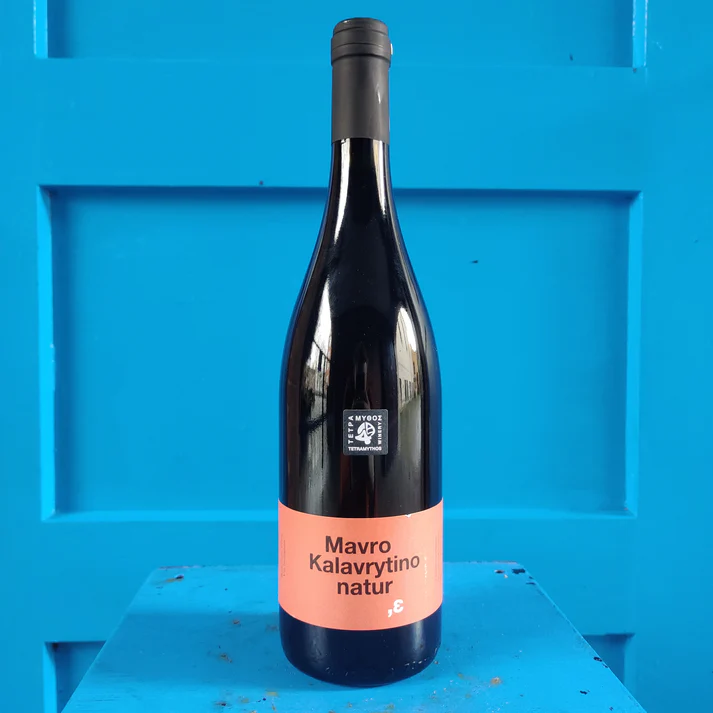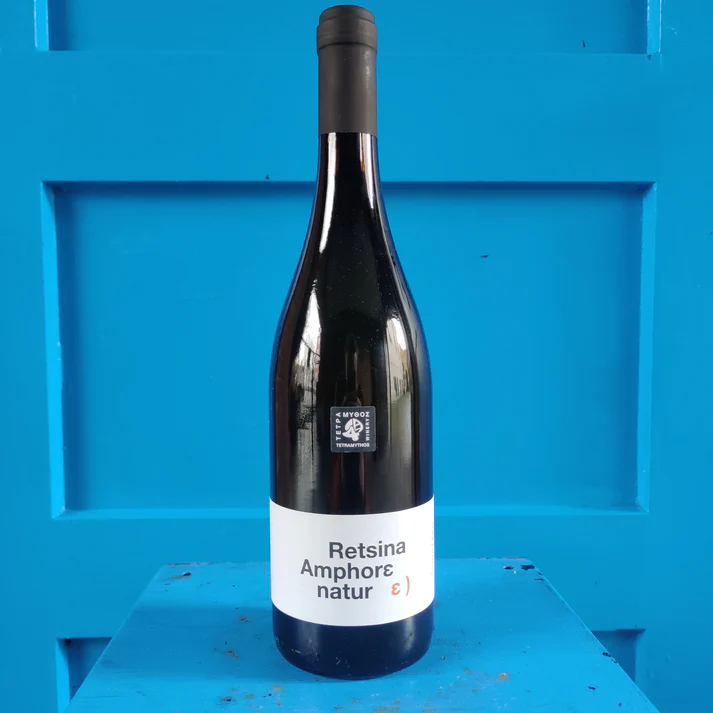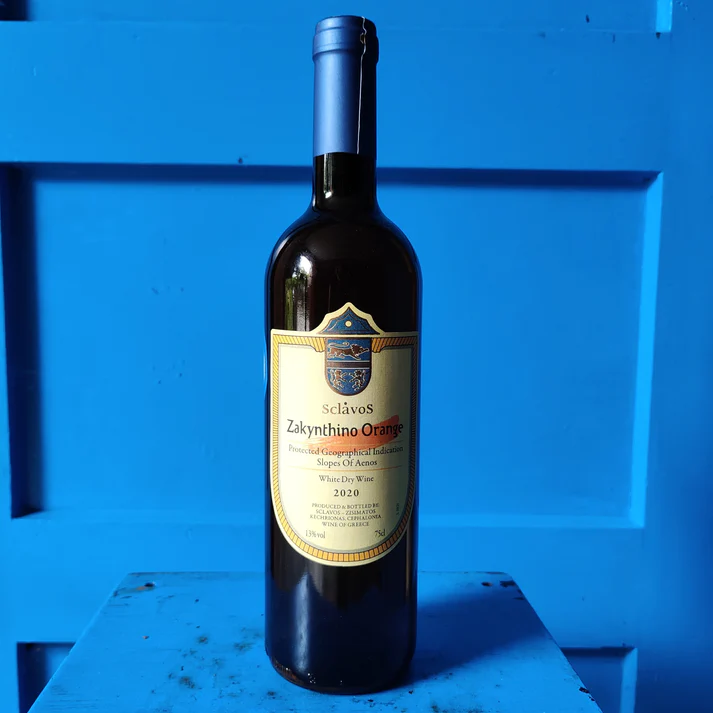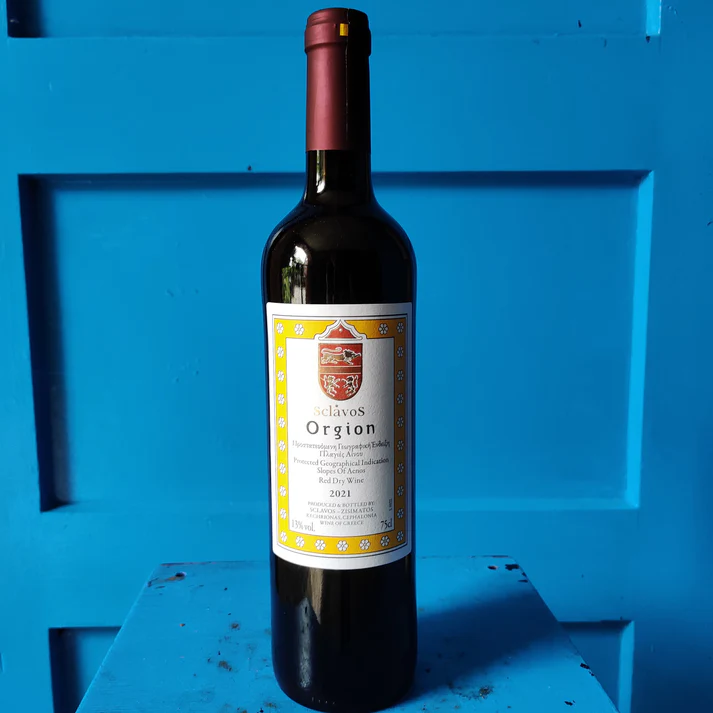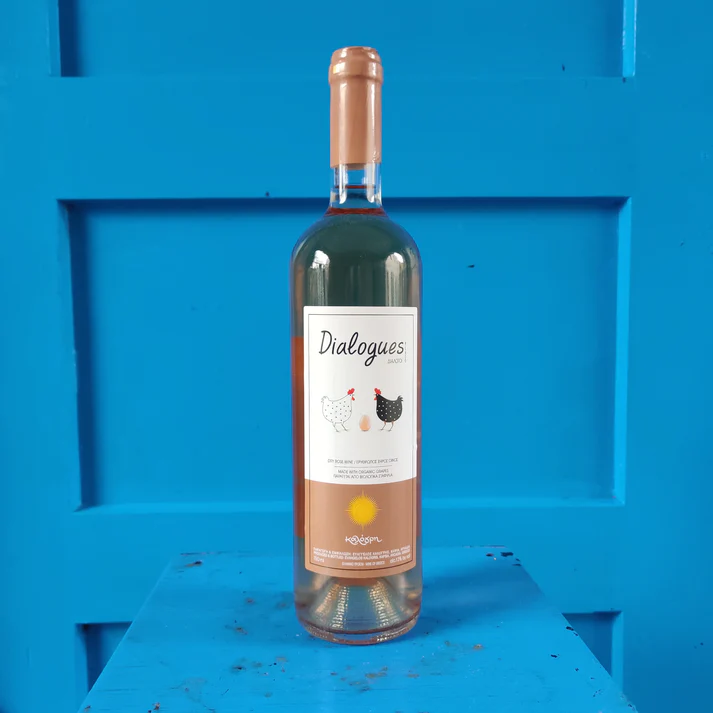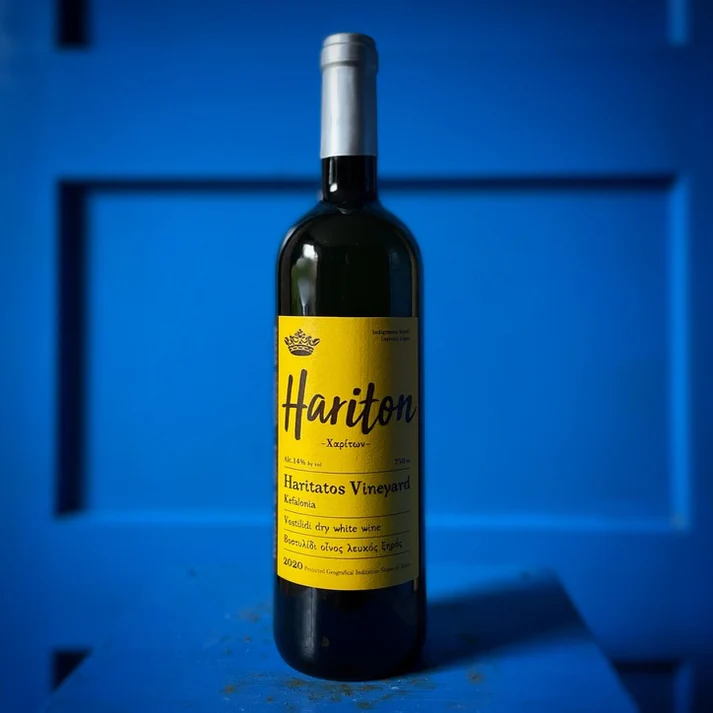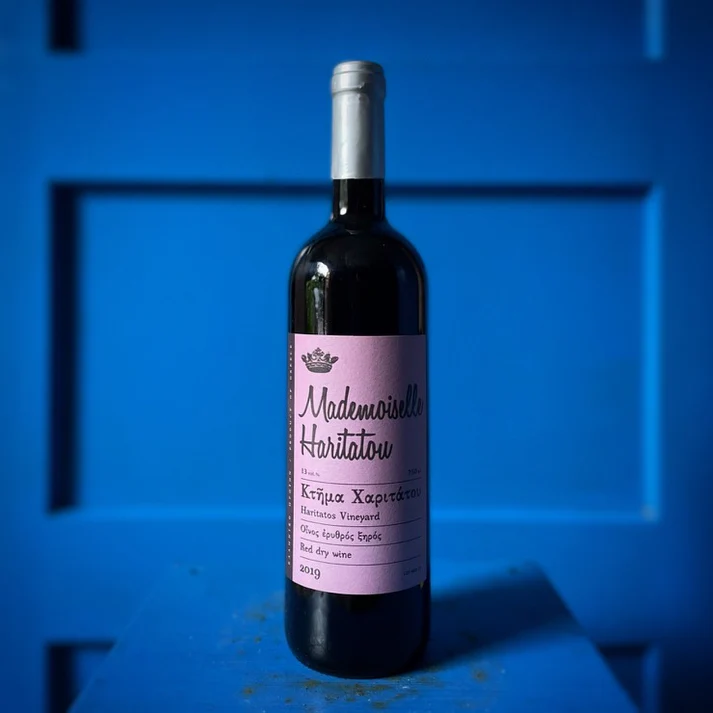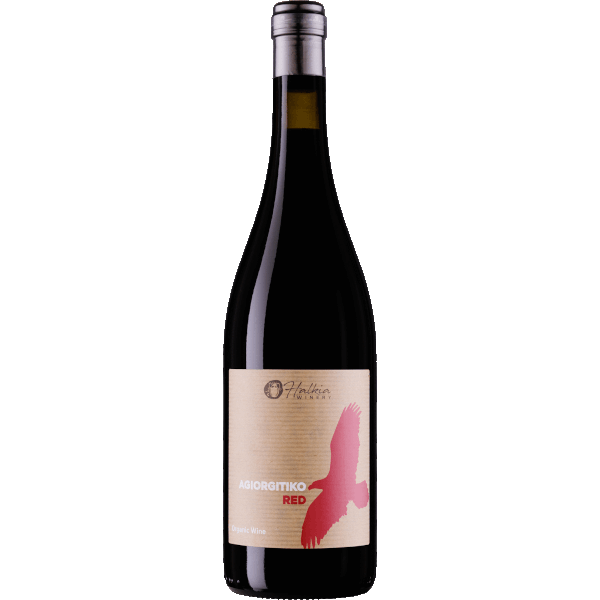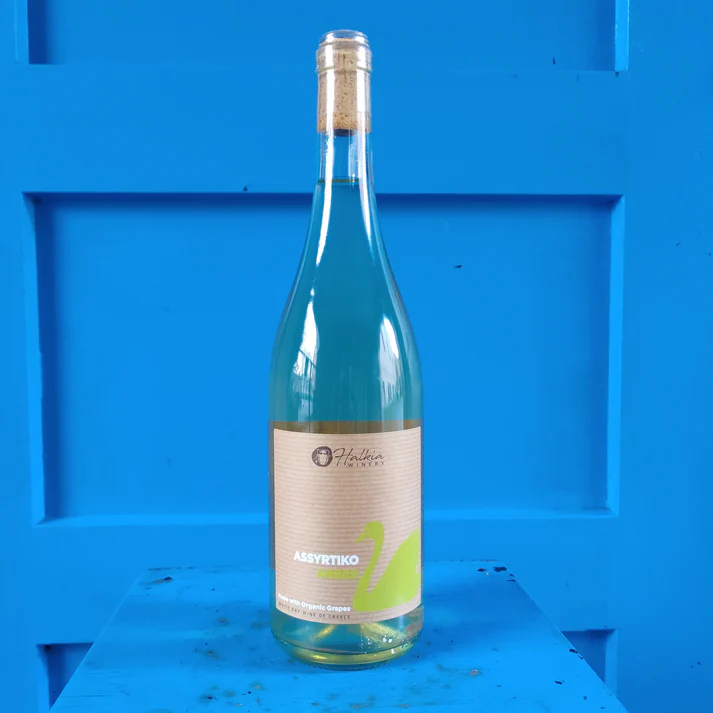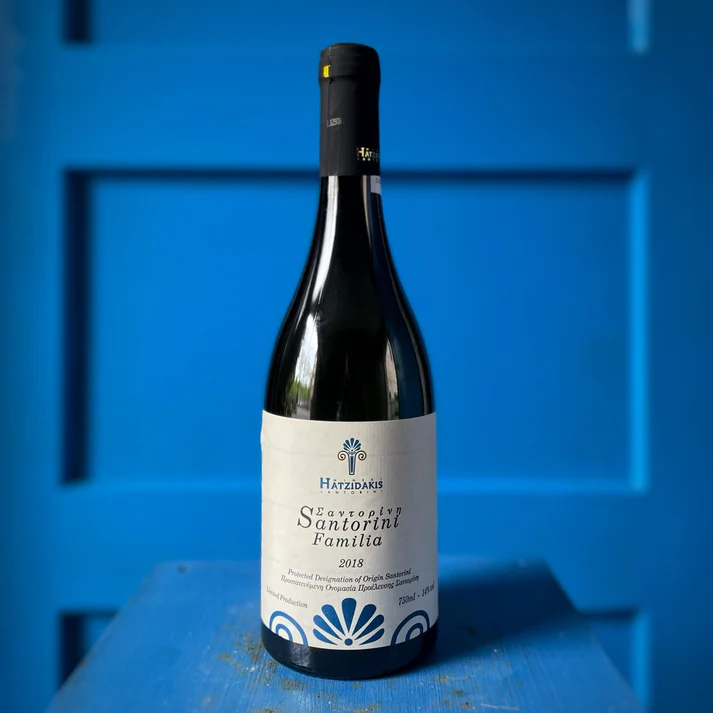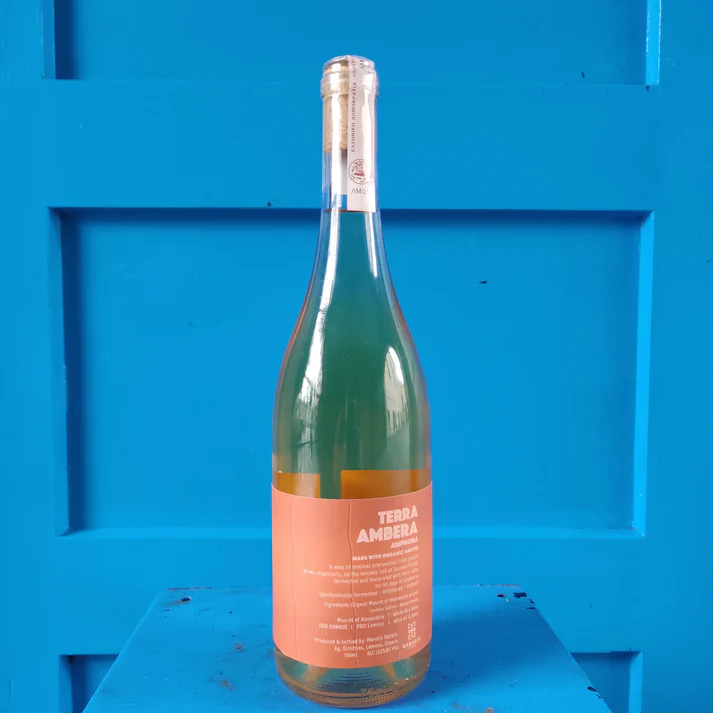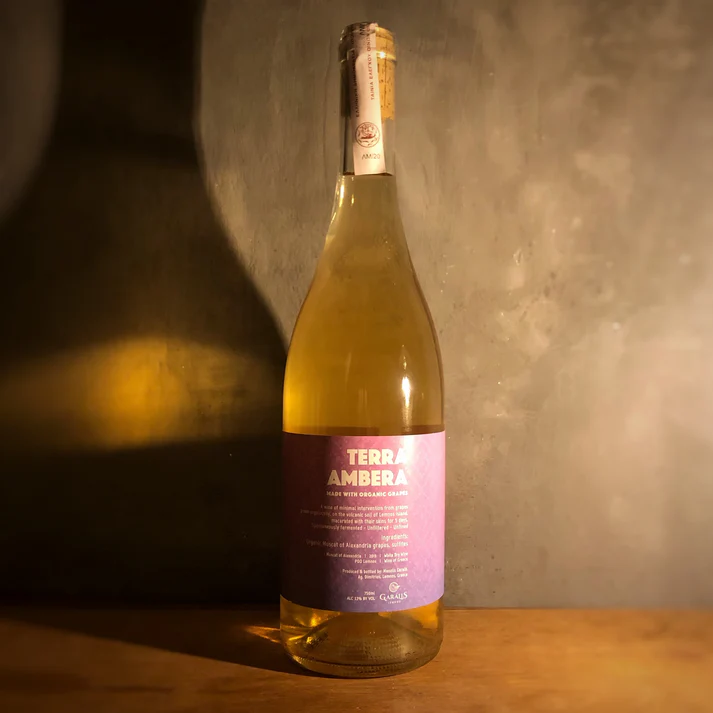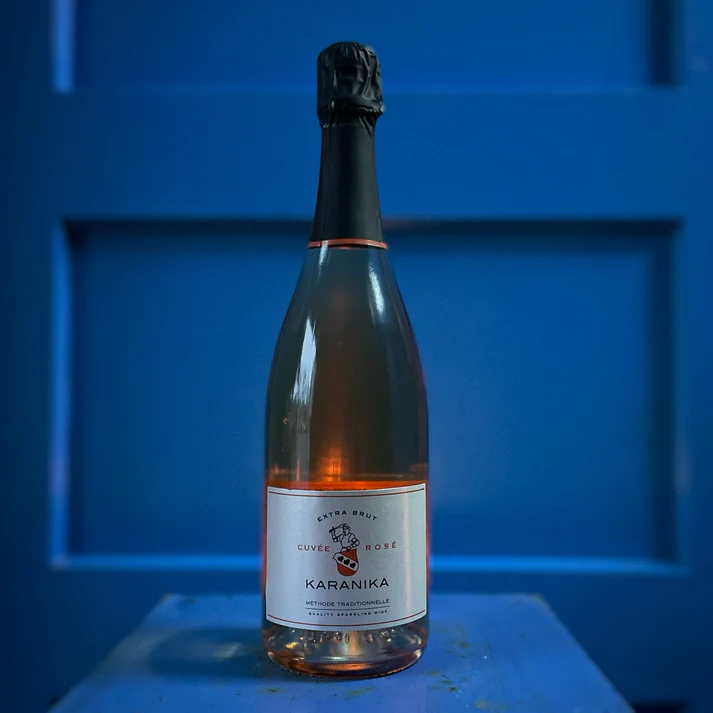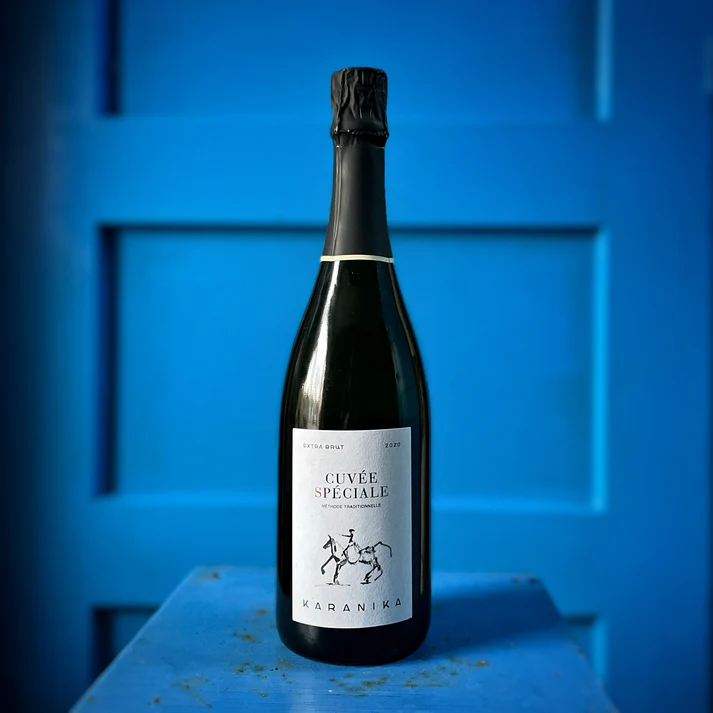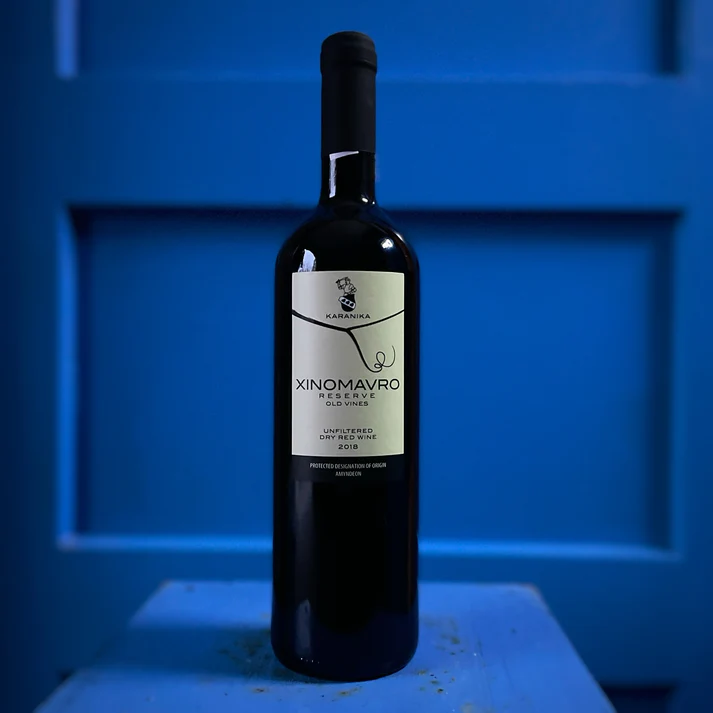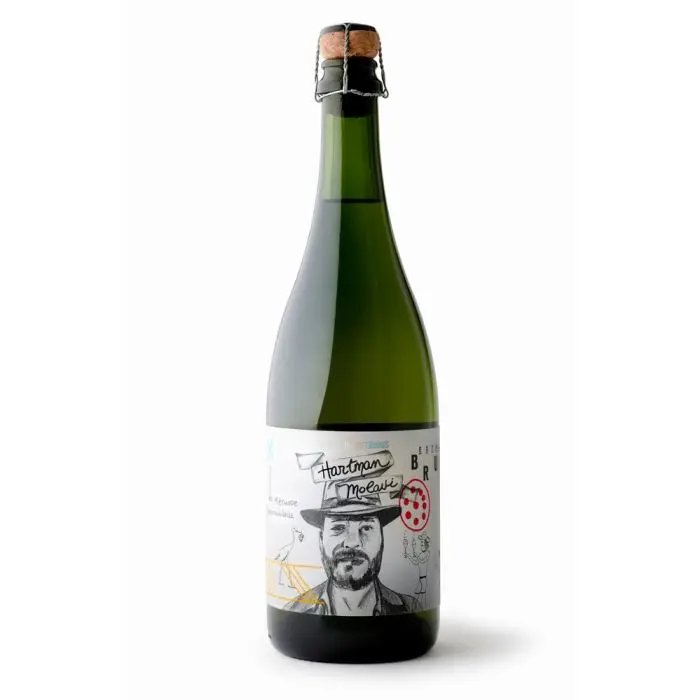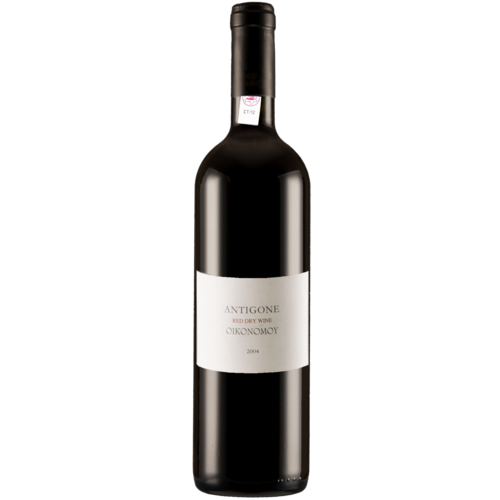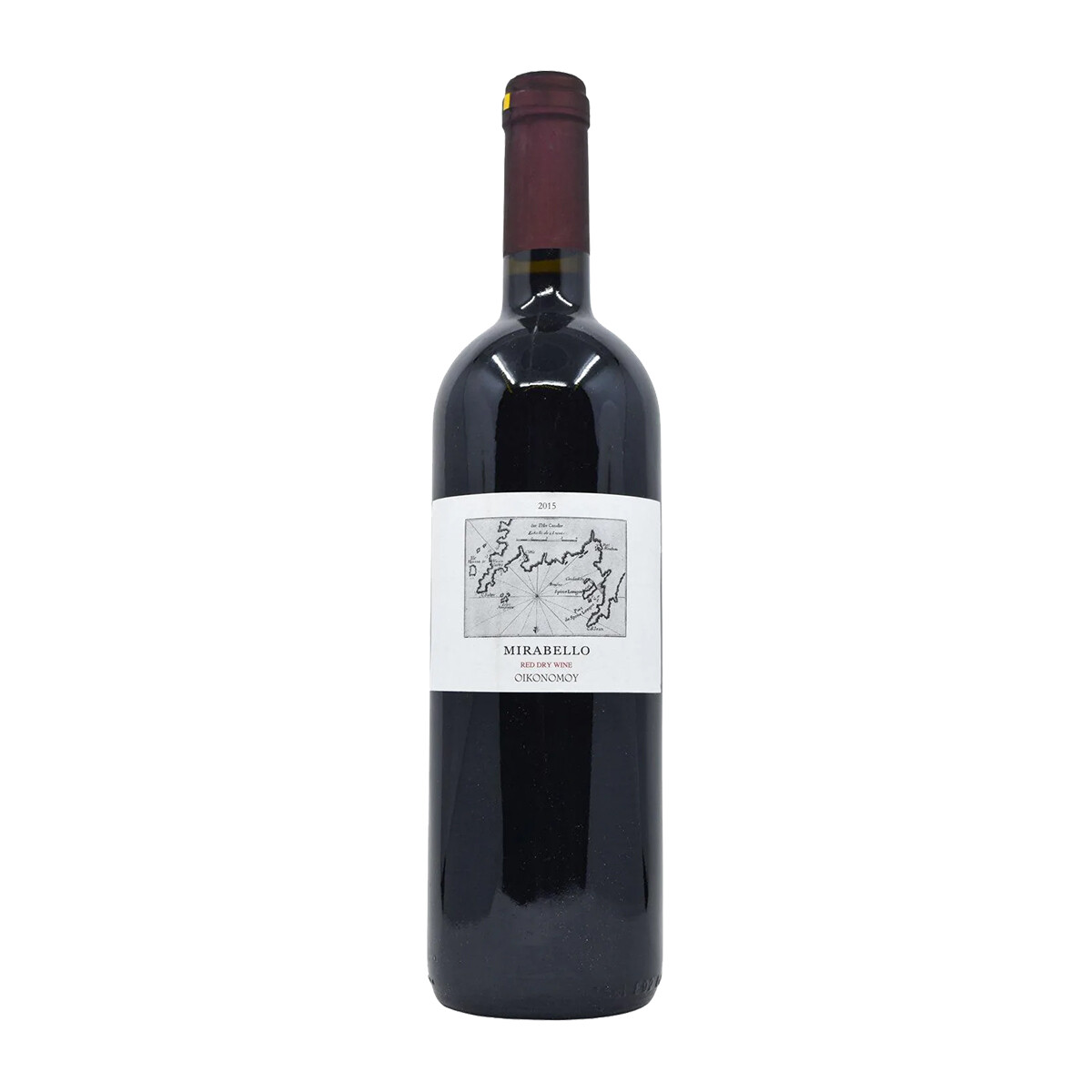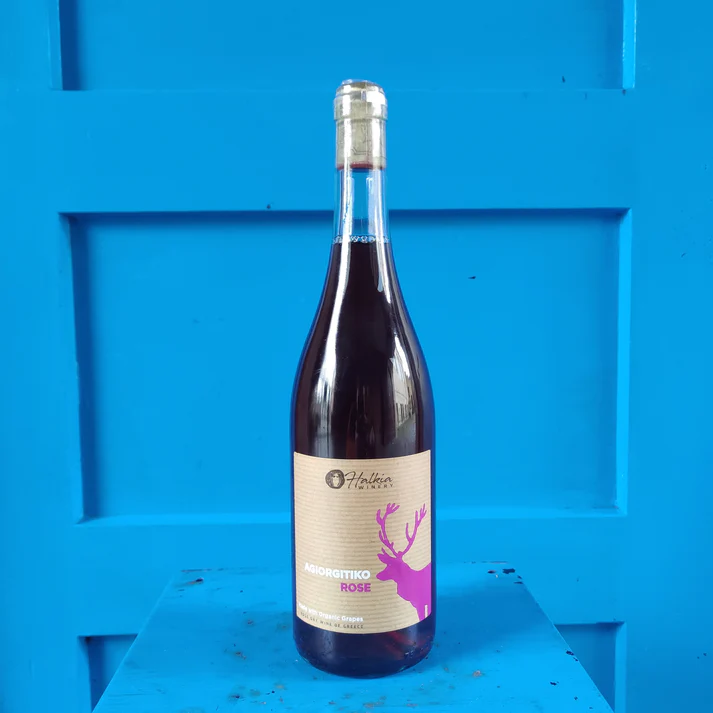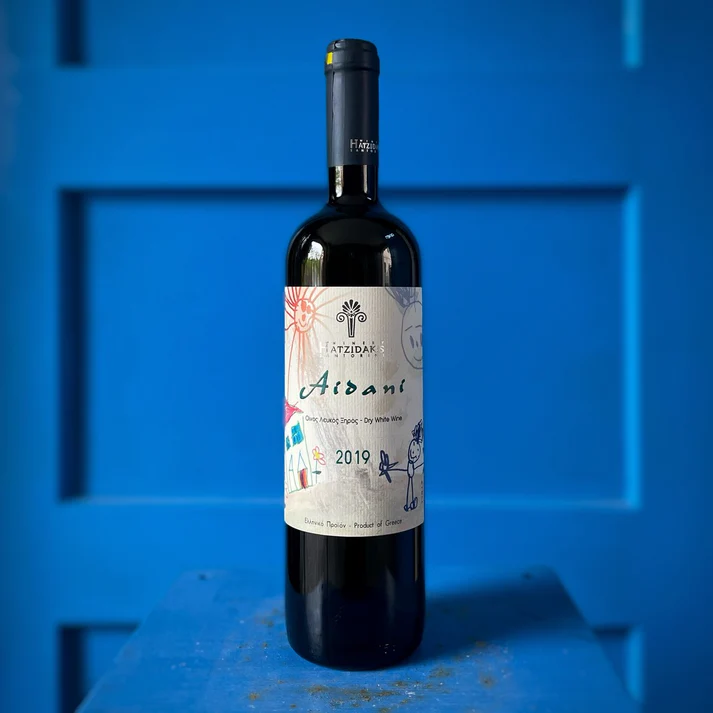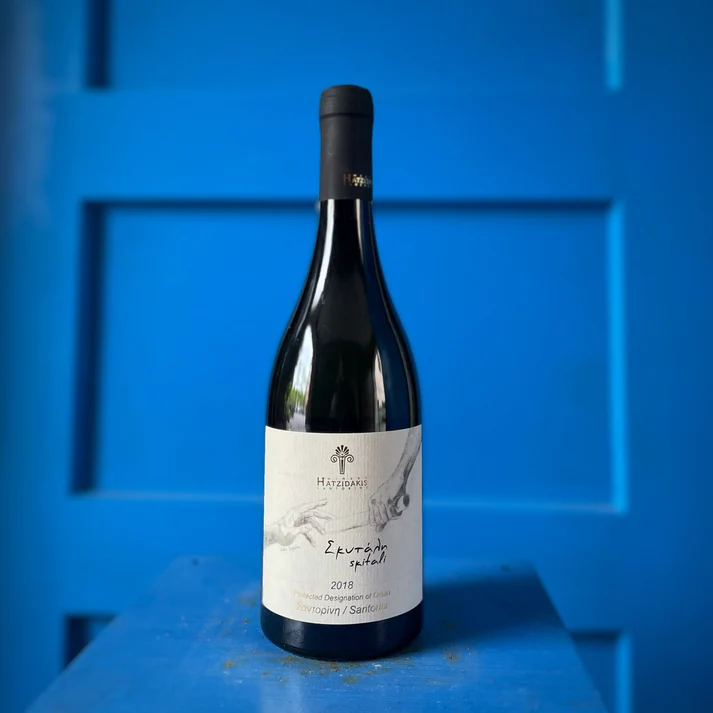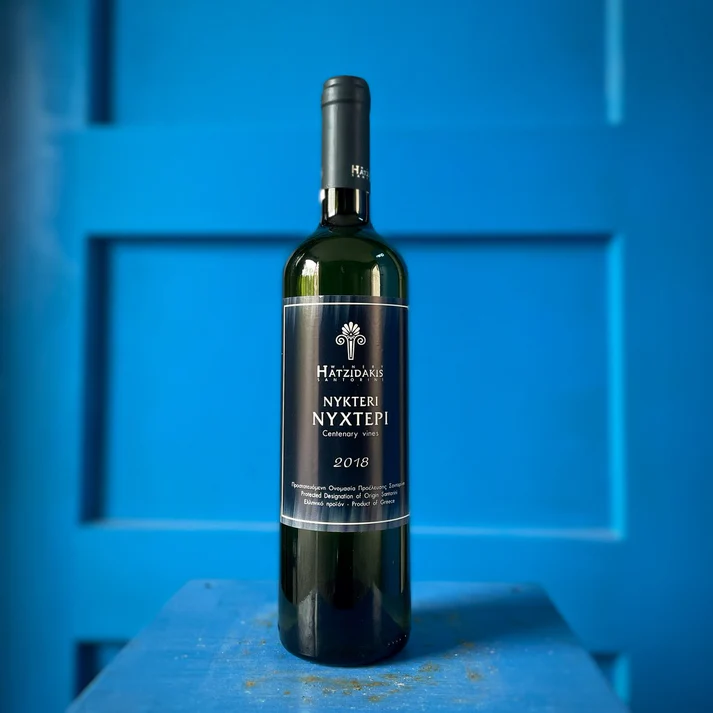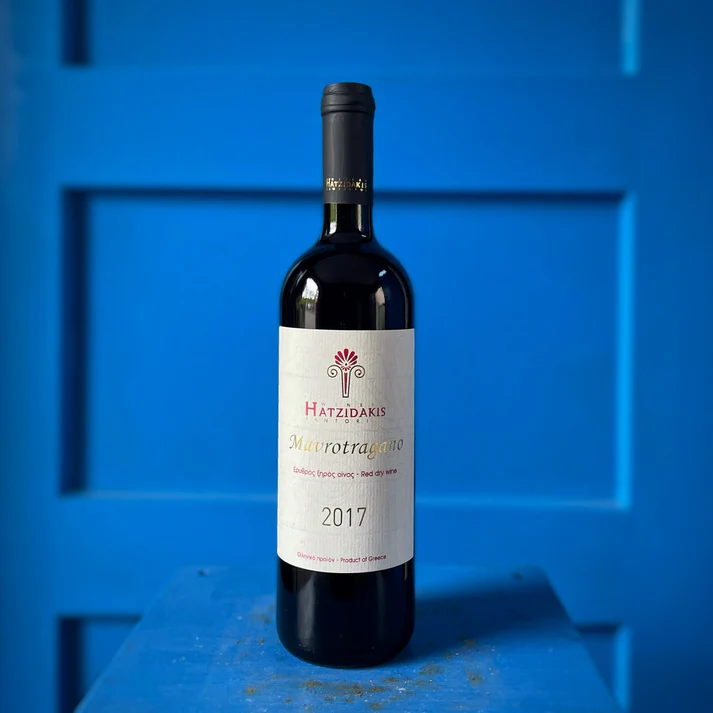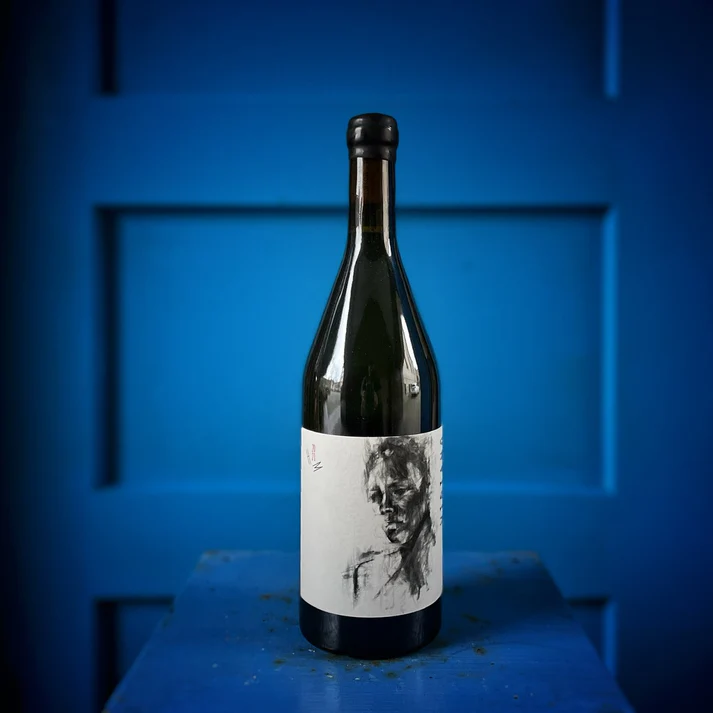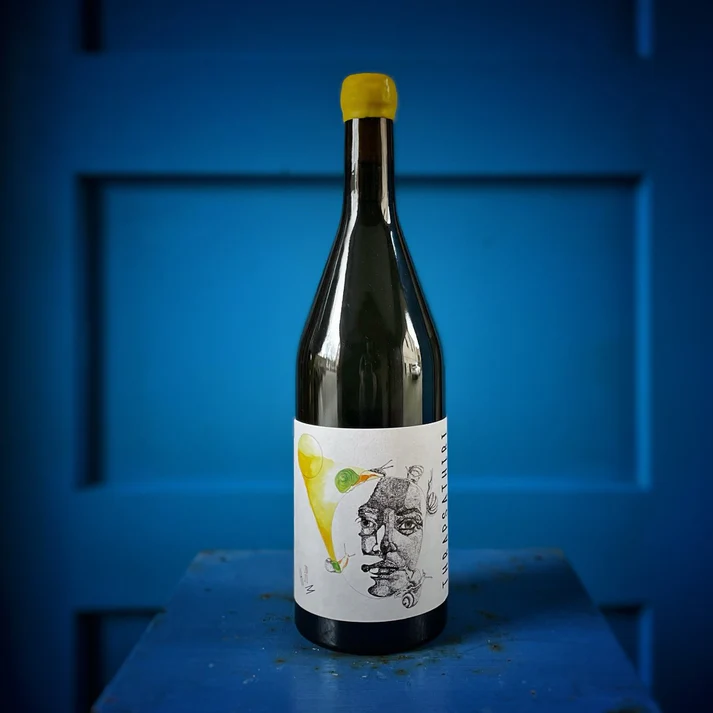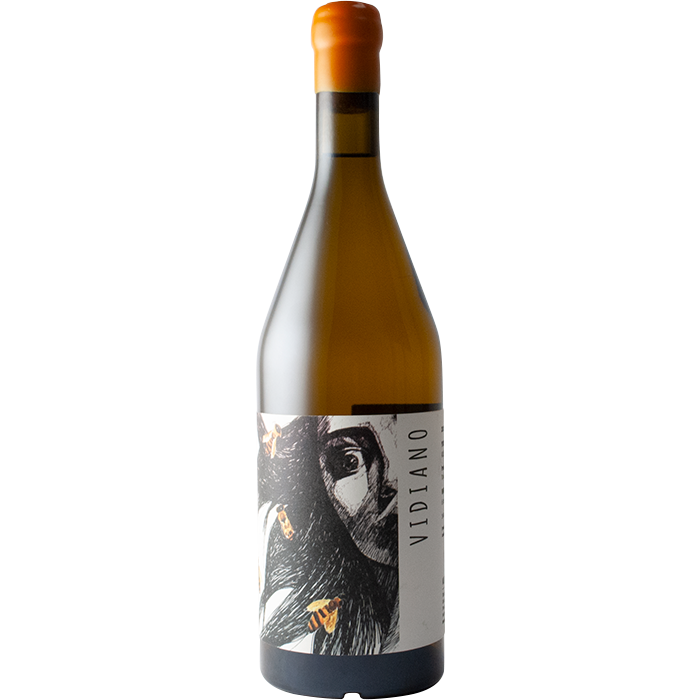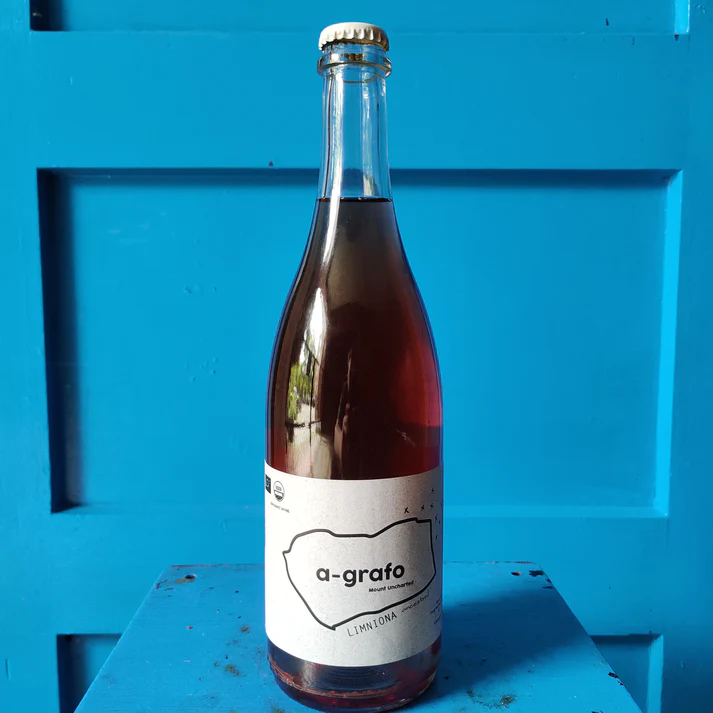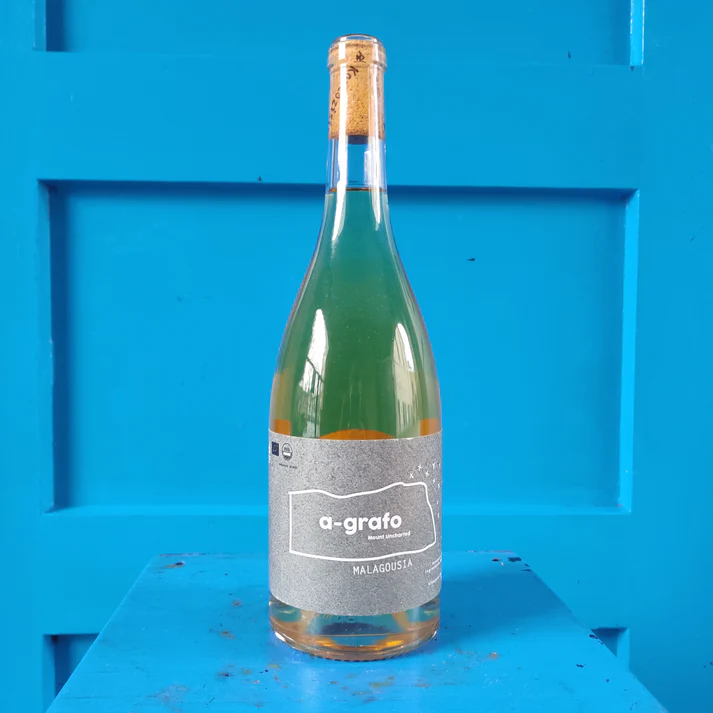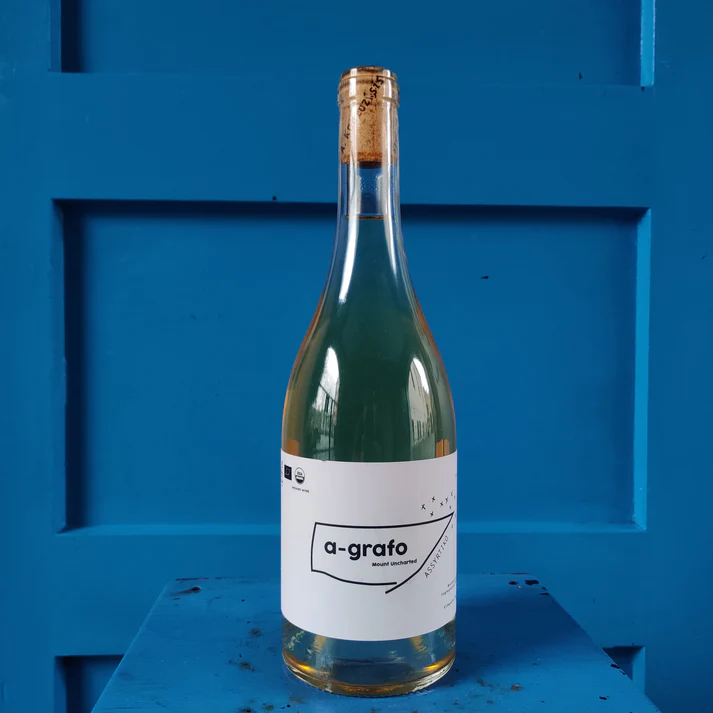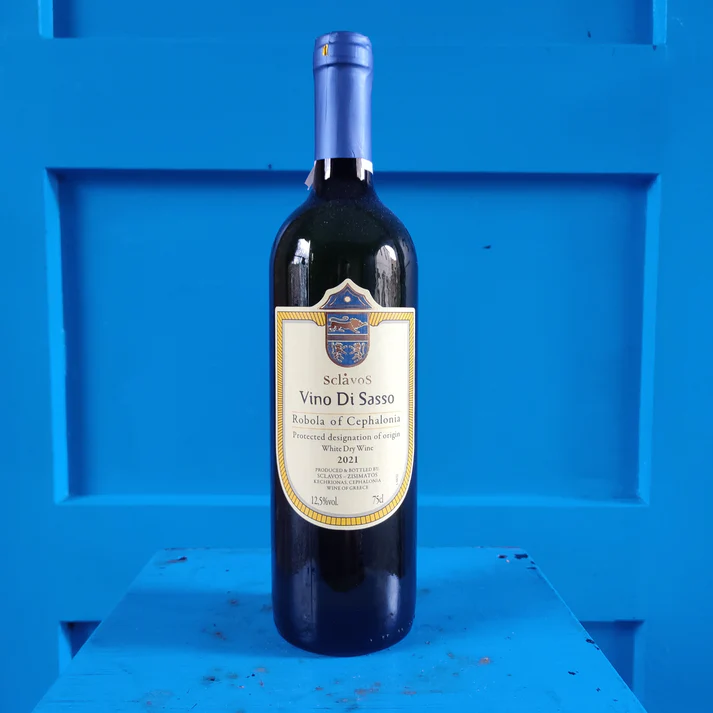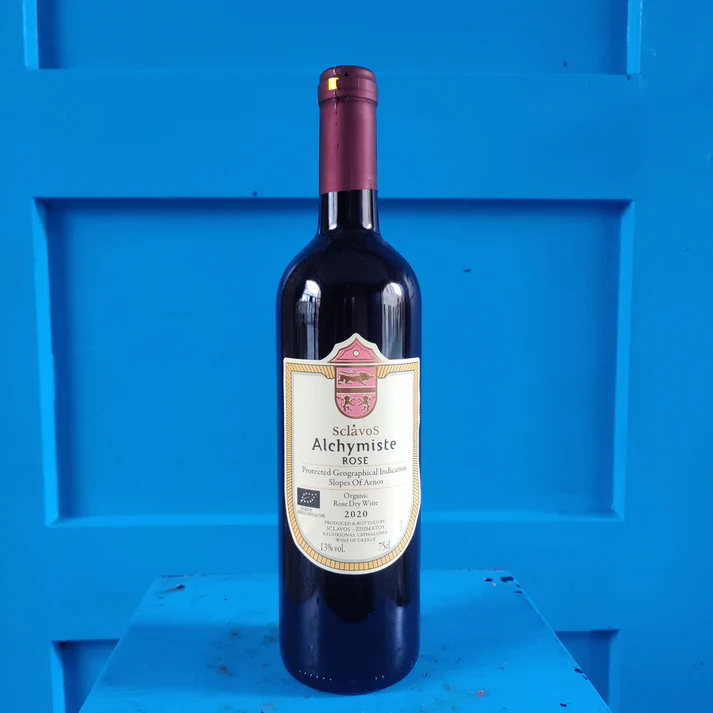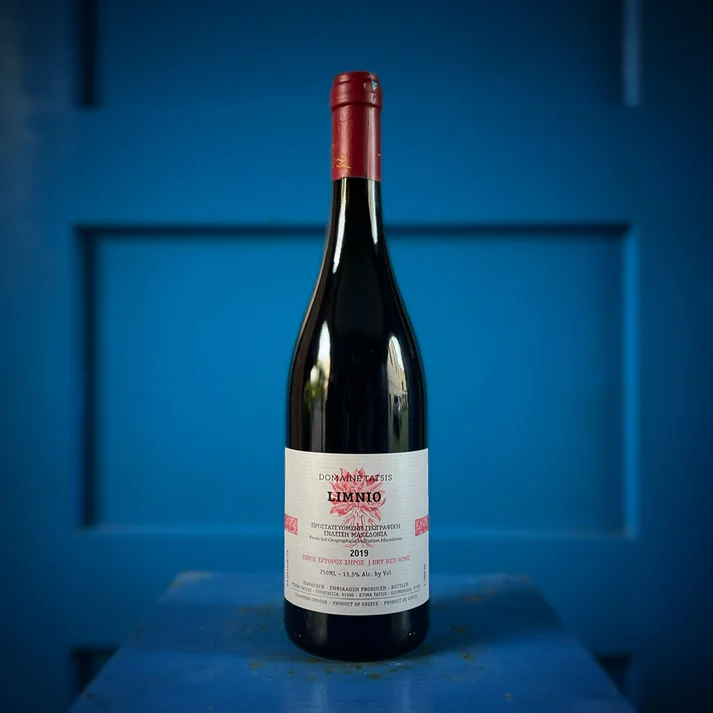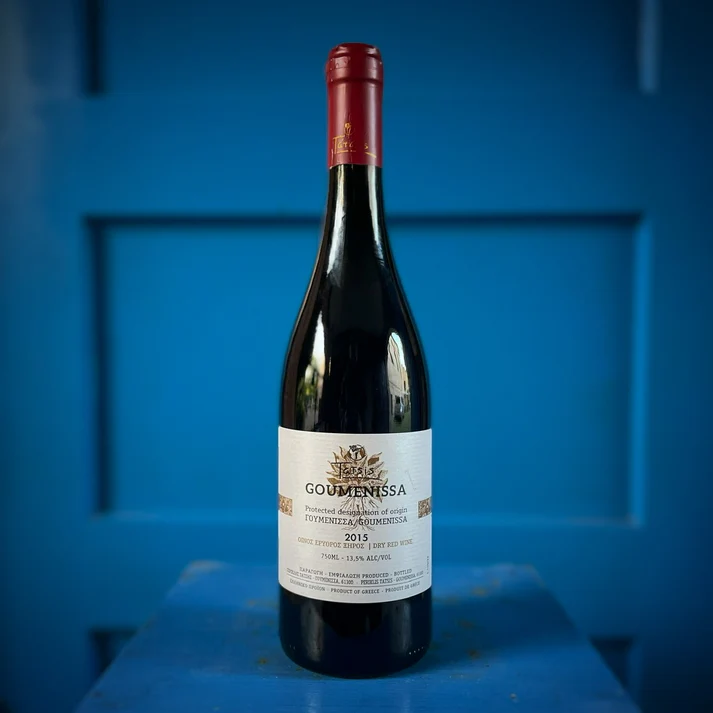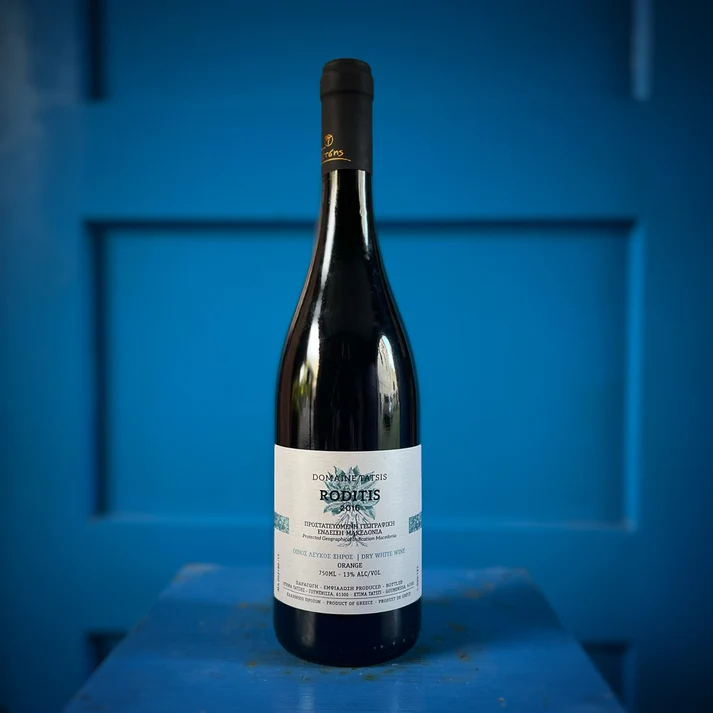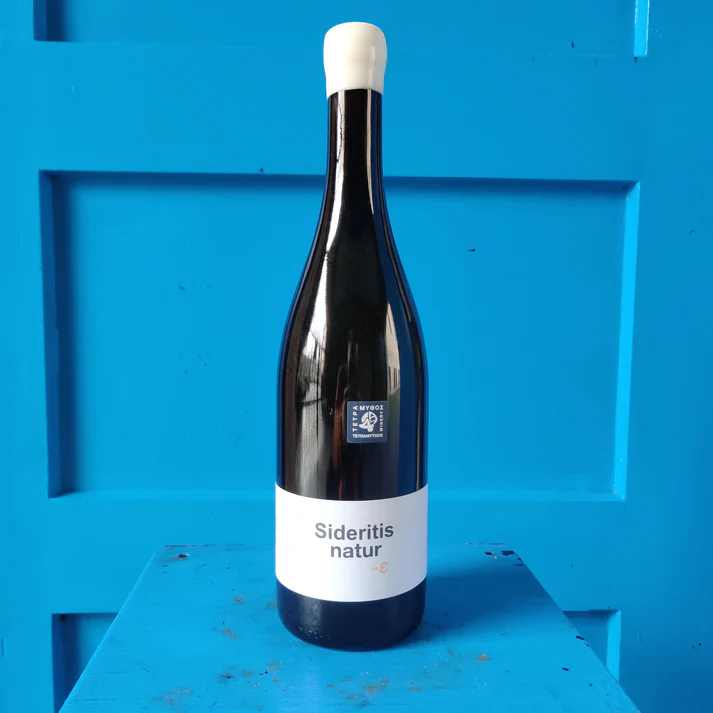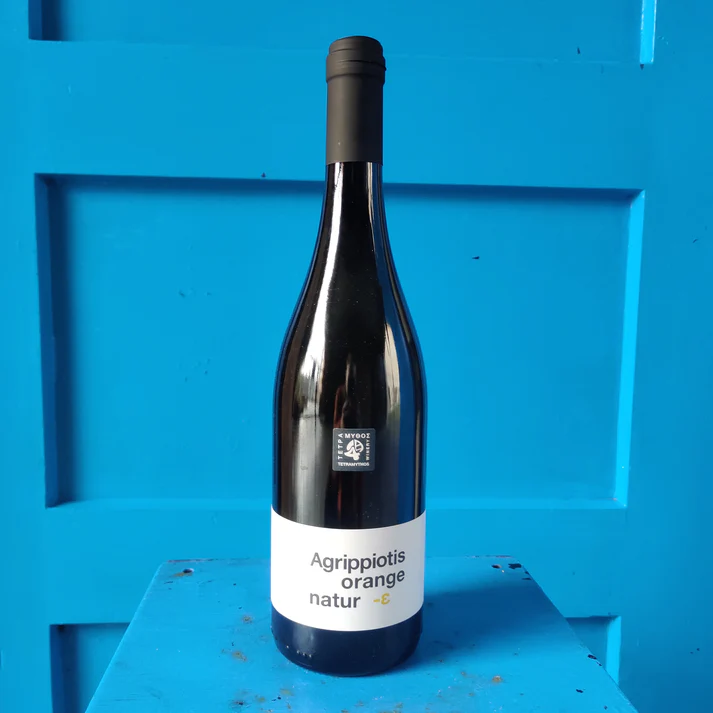Pithari Red Light Extraction is a unique natural red wine produced by Afianes Wines on the island of Ikaria, Greece. This wine showcases the indigenous Fokiano grape and the island's ancient amphora winemaking traditions.
Grape Variety
100% Fokiano
Annual Production
N/A
Cultivation
The grapes are sourced from organically and biodynamically cultivated vineyards at an altitude of 600 meters. The rugged terroir and volcanic soils of Ikaria contribute to the wine’s distinctive character.
Vinification
After manual harvesting, the grapes are foot-stomped in traditional stone presses. A brief two-day maceration precedes natural fermentation in buried amphorae, where the wine matures for 10 months. The process is entirely natural, with no added yeasts, sulfites, or filtration.
Flavor Characteristics
This wine displays a vibrant crimson red color with orange hues. On the nose, expect aromas of ripe red and black fruits, violets, and a hint of Mediterranean herbs. The palate is juicy and structured, with soft tannins and a refreshing, lingering finish.
Food Pairing
Ideal with creamy cheeses, roasted fish with herbs, game dishes, or rare red meats. The wine’s acidity also complements dishes with red plum or quince-based sauces.
Uniqueness
Pithari Red Light Extraction stands out for its adherence to ancient Ikaria winemaking methods, offering a rare glimpse into the island’s viticultural heritage while delivering a modern natural wine experience.
Pithari White is a distinctive white wine from Afianes Winery, located on the island of Ikaria in Greece. Made entirely from the indigenous Begleri grape variety, this wine offers a unique expression of the island's terroir, reflecting its volcanic soils and Mediterranean climate.
Grape
100% Begleri
Annual Production
N/A
Cultivation
The Begleri grapes are cultivated in the traditional terraced vineyards of Ikaria, situated at high altitudes. The volcanic soils, combined with the island's dry climate, contribute to the wine's mineral character and crisp acidity. The organic cultivation practices employed ensure the preservation of the land's natural biodiversity.
Vinification
After hand-harvesting, the grapes undergo fermentation with indigenous yeasts in stainless steel tanks, preserving the fresh and fruity profile of the wine. The wine is then aged on its lees for a short period to enhance its complexity and mouthfeel.
Flavor Characteristics
Pithari White exhibits a bright golden color with aromas of citrus fruits, particularly grapefruit, complemented by earthy notes reminiscent of wet granite and mushrooms. On the palate, it is rich and balanced, with vibrant acidity and a long, mineral finish.
Food Pairing
This wine pairs excellently with seafood dishes such as oysters, clams, and grilled fish. It also complements smoked cheeses and wild vegetables with lemon, making it a versatile choice for various culinary experiences.
Uniqueness
The use of the Begleri grape, a variety unique to Ikaria, imparts a distinctive character to Pithari White. The wine's complex flavor profile and mineral qualities are a true reflection of the island's unique terroir.
The Aoton Winery's, Lola Traditional Appellation is a distinctive dry rosé Retsina that exemplifies the rich winemaking heritage of Attica, Greece. Crafted from a blend of Mandilaria 70%, Savatiano 15% och Cabernet Sauvignon 15%, this wine offers a harmonious fusion of traditional and contemporary elements.
Grape Variety
Mandilaria 70%, Savatiano 15% and Cabernet Sauvignon 15%
Annual Production
Approximately 4,000 bottles per year.
Cultivation
The grapes are sourced from organic vineyards in Peania, Attica, with a planting density of 3,330 vines per hectare. The region experiences a temperate Mediterranean climate with hot, dry summers and mild winters.
Vinification
After a night harvest, the grapes are transported to the winery in small crates to maintain freshness. Fermentation occurs with indigenous yeasts, and 0.4 g/L of hand-collected Aleppo pine resin is added, imparting the characteristic Retsina flavor. The wine undergoes 8 months of aging on fine lees, enhancing its complexity.
Flavor Characteristics
The wine presents a deep pomegranate hue. On the nose, it reveals aromas of pine, mastic, pine nuts, dried strawberry, chamomile, with notes of bergamot and orange. The palate is medium-bodied with a slight tannic structure, lively acidity, and a long aftertaste.
Food Pairing
This versatile wine pairs well with subtle Asian flavors, noodles, seafood, and savory-sweet dishes.
Uniqueness
The Aoton Winery's Lola Traditional Appellation offers a unique tasting experience that bridges the ancient tradition of Retsina with modern winemaking techniques, resulting in a wine that is both authentic and innovative.
The Aoton Retsina PGI Mesogia is a traditional Greek wine from the Attica region, produced by Aoton Winery. This wine embodies the essence of Retsina, a style of wine flavored with pine resin, offering a distinctive and refreshing profile that represents Greece’s rich winemaking heritage.
Grape Variety
Savatiano 75%, Roditis 25%
Annual Production
N/A
Cultivation
The grapes used in the Aoton Retsina come from the fertile lands of the Mesogia region in Attica. The Savatiano and Roditis vines are grown in the dry, Mediterranean climate, benefiting from the warm, sunny weather that enhances the aromatic qualities of the grapes. The vineyards follow sustainable farming practices to preserve the integrity of the terroir.
Vinification
The wine is made using a blend of 75% Savatiano and 25% Roditis grapes, both indigenous to Greece. The grapes are harvested at night to preserve their freshness. Fermentation takes place in stainless steel tanks using indigenous yeasts, with the addition of Aleppo pine resin during fermentation to impart the distinctive resinous character. After fermentation, the wine is aged on its fine lees for 10 months, allowing it to develop more complexity.
Flavor Characteristics
Aoton Retsina presents a pale golden hue, and on the nose, it reveals aromas of stone fruits, herbs, and citrus, with a clear presence of pine resin. The palate is well-balanced, offering flavors of rosemary, tarragon, and lemon zest, all enhanced by the subtle resinous note that defines Retsina wines. The finish is fresh, with a lingering, herbal aftertaste.
Food Pairing
This Retsina pairs wonderfully with Greek cuisine, particularly grilled fish, seafood, and meze. It also complements dishes with strong herbal flavors such as roasted lamb or Mediterranean-style vegetables. Its unique pine note makes it an ideal match for traditional dishes like moussaka or tzatziki.
Uniqueness
What sets Aoton Retsina PGI Mesogia apart is its commitment to preserving the traditional characteristics of Retsina while elevating the overall quality. The wine’s balance of fruit, herbs, and pine resin creates a harmonious and refreshing profile that remains true to its roots, yet stands out with modern winemaking techniques and the careful attention of Aoton Winery.
Introduction
Mrs. Poulia is a remarkable skin-contact rosé wine from Kalogris Organic Winery, crafted from the indigenous Moschofilero grape. The wine offers a unique expression of the varietal, with its beautiful orange-pink hue and complex aromatics, making it an exceptional representation of Greek winemaking.
Grape Variety
Moschofilero
Annual Production
N/A
Vinification
Mrs. Poulia is produced using skin-contact fermentation, a traditional method that imparts a vibrant orange-pink color to the wine. This technique also enhances the aromatic complexity and texture, resulting in a dry, crisp wine with a rich, layered profile. The wine undergoes organic and biodynamic practices in the vineyard, aligning with the winery’s commitment to sustainability.
Flavor Characteristics
Mrs. Poulia is characterized by its crisp and bone-dry profile, with vibrant acidity and expressive citrus notes. Aromas of blood orange, rose petals, and fresh herbs dominate, with subtle hints of spice. The texture is round and smooth, offering a refreshing and balanced finish that highlights the unique qualities of the Moschofilero grape.
Food Pairing
This wine pairs wonderfully with light, fresh dishes such as seafood, goat cheese, or salads with citrus vinaigrette. It also complements Mediterranean cuisine, including grilled vegetables and pasta dishes with a light tomato sauce.
Uniqueness
Mrs. Poulia stands out due to its skin-contact fermentation, which imparts a striking orange-pink color and enhances the depth of flavors and aromatics in the wine. This distinctive winemaking technique, combined with the expressive nature of the Moschofilero grape, results in a wine that is both innovative and true to its Greek roots.
Limnio Short Skin is an organic red dry wine from Garalis Winery, located on the volcanic island of Lemnos in Greece. This wine showcases the ancient Limnio grape, celebrated for its unique expression of the island's terroir and maritime influence.
Grape Variety
100% Limnio
Annual Production
3,100 bottles
Cultivation
The vineyards are cultivated organically on volcanic soils, benefitting from Lemnos’ warm Mediterranean climate and cooling sea breezes. These factors contribute to the grape's vibrant acidity and aromatic complexity.
Vinification
The wine undergoes a short skin-contact fermentation with indigenous yeasts, lasting 15 days in stainless steel tanks. This minimal intervention approach preserves the freshness and delicate fruitiness of the Limnio grape. The wine is neither filtered nor clarified, emphasizing its natural character.
Flavor Characteristics
Limnio Short Skin offers a youthful and aromatic profile, with notes of cranberries, red cherries, strawberries, and subtle floral hints of violets. On the palate, it delivers refreshing acidity, soft tannins, and a light-to-medium body, culminating in a clean and persistent finish.
Food Pairing
This versatile wine pairs beautifully with lamb dishes, roasted duck, pasta with tomato-based sauces, grilled quail, and aged cheeses accompanied by red fruit chutneys.
Uniqueness
Limnio Short Skin stands out as a modern interpretation of an ancient varietal. Its short maceration period and natural winemaking techniques highlight the grape's purity and the distinctive volcanic terroir of Lemnos.
Roditis Nature from Tetramythos Wines is a captivating natural wine made exclusively from the indigenous Roditis grape, known for its ability to produce wines with fresh acidity and vibrant fruit flavors. This wine reflects the winery’s commitment to organic practices and minimal intervention winemaking, bringing out the true essence of the grape and the unique characteristics of its terroir.
Grape Variety
100% Roditis
Annual Production
N/A
Cultivation
The Roditis grapes for this wine are grown in the high-altitude vineyards of the Kalavryta region, where the cooler climate helps to preserve the natural acidity and freshness of the fruit. Organic farming methods are employed, ensuring that no synthetic chemicals are used in the vineyard. The altitude and specific microclimates in the region provide the perfect environment for growing Roditis, contributing to the wine’s distinct flavor profile.
Vinification
The grapes are hand-harvested and undergo a natural fermentation process using indigenous yeasts, which allows for a more authentic expression of the grape variety. The wine is fermented and aged in stainless steel tanks, maintaining its fresh and lively character. No filtration or fining is applied, ensuring a pure and unaltered wine that is true to its natural roots.
Flavor Characteristics
Roditis Nature has a pale yellow color with hints of green. On the nose, it offers aromas of fresh citrus, green apple, and white flowers, with a touch of herbaceous notes. On the palate, the wine is crisp and refreshing, with flavors of lemon zest, apple, and a mineral undertone that adds complexity. The lively acidity balances the wine beautifully, and the finish is clean, leaving a refreshing aftertaste.
Food Pairing
This wine pairs excellently with light seafood dishes, grilled vegetables, salads, and goat cheese. It also complements Mediterranean dishes such as tzatziki, hummus, or roasted chicken with lemon.
Uniqueness
Roditis Nature stands out for its pure, unadulterated expression of the Roditis grape, showcasing the fresh and vibrant qualities of this indigenous variety. The wine's natural production process, minimal intervention, and focus on organic viticulture make it a true representation of Tetramythos Wines' philosophy.
Agiorgitiko Natur from Tetramythos Wines is a natural wine made from the Agiorgitiko grape, one of Greece's most renowned red varieties. This wine is a testament to the winery's commitment to organic and sustainable winemaking, offering a pure expression of the grape’s character in its most authentic form.
Grape Variety
100% Agiorgitiko
Annual Production
N/A
Cultivation
The Agiorgitiko grapes for this wine are grown in the mountainous vineyards in the Peloponnese Region, known for its ideal terroir for Agiorgitiko. The vines are cultivated following organic farming practices, ensuring the highest quality of fruit without the use of synthetic chemicals, pesticides, or herbicides.
Vinification
After hand-picking the grapes, fermentation takes place using native yeasts, with minimal intervention throughout the process. The wine is aged in neutral oak barrels to preserve the fresh and fruity character of the Agiorgitiko grape. It is bottled without filtration or fining, embodying the natural winemaking philosophy of the winery.
Flavor Characteristics
Agiorgitiko Natur presents a deep ruby color with intense aromas of dark berries, such as black cherry and plum, complemented by hints of violet and earthy spices. On the palate, it is medium-bodied with soft tannins and balanced acidity, offering flavors of ripe red fruits, herbs, and a touch of pepper. The finish is clean and refreshing, making it a versatile wine with great aging potential.
Food Pairing
This wine pairs beautifully with grilled meats, lamb dishes, pasta with tomato-based sauces, and Mediterranean cuisine. Its freshness and fruitiness make it an excellent companion to a wide range of savory dishes.
Uniqueness
What sets Agiorgitiko Natur apart is its commitment to the natural winemaking process, showcasing the unique qualities of the Agiorgitiko grape without any manipulation. The absence of filtration and the use of organic farming practices allow the true expression of the terroir and grape variety to shine through in the final product.
Mavro Kalavrytino Natur from Tetramythos Winery is a distinctive red wine crafted from the rare Mavro Kalavrytino grape, indigenous to the Kalavryta region in northern Peloponnese, Greece. This wine exemplifies the winery's commitment to organic and natural winemaking practices, offering a unique expression of Greek viticulture.
Grape Variety
100% Mavro Kalavrytino
Annual Production
N/A
Cultivation
The Mavro Kalavrytino (Μαύρο Καλαβρυτινό)is a rare, indigenous red grape variety native to the Kalavryta region in northern Peloponnese, Greece. The grapes are sourced from privately owned vineyards situated at high altitudes, between 650 and 1,050 meters above sea level, on the slopes of Mount Aroania. The region's cool climate, with breezes from the Gulf of Corinth, contributes to the grapes' fresh and balanced character. The vineyards are cultivated organically, ensuring sustainability and environmental harmony.
Vinification
After hand-picking, the grapes undergo fermentation with native yeasts and minimal intervention. The wine is aged in large oak tanks for 12 months, allowing it to develop its complex flavors. It is bottled unfiltered and unfined, with minimal sulfur use, preserving its natural character.
Flavor Characteristics
Mavro Kalavrytino presents a vivid and brilliant ruby color. The nose is expressive, featuring aromas of cherry, violet, spices, and subtle floral notes. On the palate, it offers a medium-bodied mouthfeel with a botanical character, while its characteristic tannins provide a delightful aftertaste that lingers. Flavors of cherry, strawberry, sour cherry, plum, blueberry, cinnamon, licorice, vanilla, and butterscotch are evident.
Food Pairing
This wine pairs well with stuffed meats, fillets of fish, baked dishes, and lightly cooked meats, enhancing the dining experience with its vibrant acidity and subtle complexity.
Uniqueness
Mavro Kalavrytino Natur stands out for its rarity and the rediscovery of the Mavro Kalavrytino grape, once thought extinct. The natural winemaking process, including fermentation with native yeasts and aging in large oak tanks, results in a wine that is both expressive and true to its origins. Its limited production further underscores its exclusivity.
Retsina Amphore Nature from Tetramythos Winery is a modern interpretation of Greece's traditional Retsina, crafted with organic Roditis grapes and fermented in clay amphorae. This natural wine offers a fresh perspective on Retsina, emphasizing the grape's character with subtle resin notes.
Grape Variety
100% Roditis
Annual Production
N/A
Cultivation
The Roditis grapes are sourced from organic, unirrigated vineyards situated at high altitudes in Aigialia, Peloponnese. The region's semi-continental climate, characterized by hot, dry summers and cold winters, contributes to the grapes' unique flavor profile. The vineyards are cultivated using biodynamic practices, ensuring sustainability and environmental harmony.
Vinification
After hand-picking, the grapes undergo wild fermentation in clay amphorae, a traditional method that imparts subtle earthy nuances to the wine. The wine is aged on its lees, enhancing its complexity and mouthfeel. Minimal pine resin is added—approximately one kilogram per ton of grapes—derived from the surrounding pine trees, imparting a delicate resinous character without overpowering the wine's natural flavors.
Flavor Characteristics
Retsina Amphore Nature presents a pale lemon-green color. The nose is expressive, featuring aromas of lemon, citron, peach, and pear, complemented by subtle hints of pine resin, chamomile, and rosemary. On the palate, it is dry with a crisp acidity, offering flavors of citrus fruits, green apple, and a touch of honeyed beeswax, leading to a clean, refreshing finish.
Food Pairing
This wine pairs excellently with seafood dishes such as grilled octopus, fried calamari, or a fresh seafood salad. It also complements goat cheese and feta, enhancing the dining experience with its vibrant acidity and subtle resinous notes.
Uniqueness
Retsina Amphore Nature stands out for its natural winemaking approach, utilizing organic Roditis grapes and traditional fermentation methods in clay amphorae. The minimal addition of pine resin distinguishes it from conventional Retsina, offering a refined and balanced expression of this historic Greek wine.
Zakynthino from Sclavos Winery is a distinctive white wine crafted exclusively from the rare Zakynthino grape, native to the Ionian Islands of Greece. Sclavos Winery, situated on the island of Cephalonia, is renowned for its commitment to organic and biodynamic viticulture, producing wines that authentically express the unique terroir of the region.
Grape Variety
100% Zakynthino
Annual Production
N/A
Cultivation
The Zakynthino vines are cultivated in the Elios area of southern Cephalonia, at altitudes ranging from 50 to 150 meters. The vineyards, aged over 40 years, are planted in loamy clay soils with southwestern exposure, benefiting from the influence of the Ainos mountain range. This microclimate provides excellent conditions for the development of the Zakynthino grape. Sclavos Winery practices certified organic and biodynamic viticulture, emphasizing sustainability and environmental harmony.
Vinification
The grapes are hand-harvested in the second fortnight of August. Vinification follows biodynamic principles, including spontaneous fermentation with indigenous yeasts. The wine undergoes fermentation and maturation in stainless steel tanks, with a stay on fine lees for about seven months without the addition of preservatives. Bottling is done without filtration, adhering to natural winemaking practices that preserve the wine's authenticity.
Flavor Characteristics
Zakynthino presents a bright, almost orange color in the glass. The nose is characterized by aromas of ripe peaches, honey, and citrus peel, complemented by notes of dried apricot and almond. On the palate, it is medium-bodied with a rich texture, balanced acidity, and flavors reminiscent of raisins, caramel, and orange bitters. The wine finishes with a long, savory aftertaste, showcasing its explosive minerality.
Food Pairing
This wine pairs excellently with cured meats, spiced Asian dishes, roast white meats, and aged cheeses, enhancing the dining experience with its vibrant acidity and complex flavor profile.
Uniqueness
Zakynthino stands out for its expression of the rare Zakynthino grape, showcasing the varietal's potential when cultivated in the unique terroir of Cephalonia. The winery's commitment to organic and biodynamic practices further enhances the wine's reflection of its environment, making it a distinctive addition to Greece's diverse wine landscape.
Orgion from Sclavos Winery is a pioneering dry red wine crafted exclusively from the indigenous Mavrodaphne grape, traditionally associated with sweet wines. Sclavos Winery, located in Lixouri on the island of Cephalonia, Greece, is renowned for its commitment to organic and biodynamic viticulture, producing wines that authentically express the unique terroir of the region.
Grape Variety
100% Mavrodaphne of Kefalonia
Annual Production
N/A
Cultivation
The PDO Mavrodaphne of Kefalonia (ΠΟΠ Μαυροδάφνη Κεφαλληνίας) vines are cultivated in the Paliki peninsula of Cephalonia, at altitudes ranging from 50 to 150 meters. Mavrodaphne of Kefalonia is an indigenous red grape variety from the Greek island of Cephalonia. Known for its deep color and aromatic complexity, it traditionally produces sweet, fortified wines but has gained recognition for its potential in dry red wines. The vineyards, aged over 40 years, are planted in diverse soils, from clayey-calcareous to limestone, and are interspersed with uncultivated areas and olive groves, promoting biodiversity. Sclavos Winery practices certified organic and biodynamic viticulture, emphasizing sustainability and environmental harmony.
Vinification
The grapes are hand-harvested in the first fortnight of September. Vinification follows biodynamic principles, including spontaneous fermentation with indigenous yeasts and extended maceration. The wine undergoes malolactic fermentation and matures for 12 months in French oak barrels of varying capacities (300 to 500 liters). Bottling is done without filtration or additional treatments, adhering to natural winemaking practices that preserve the wine's authenticity.
Flavor Characteristics
Orgion presents a deep ruby color in the glass. The nose is moderate, with aromas of chocolate, plum, raspberry, coffee beans, cocoa, and tobacco. Cinnamon and earthy notes of fresh soil complement the bouquet. On the palate, it is medium-bodied, with velvety tannins and refreshing acidity. Flavors of chocolate, plum, and dried fig stand out, with chocolate persisting in the long finish.
Food Pairing
This wine pairs excellently with cooked red meats, traditional Cephalonian meat pies, game, or aged yellow cheeses, complementing its rich and complex profile.
Uniqueness
Orgion is notable for being one of the first dry wines made from Mavrodaphne of Kefalonia, a grape traditionally used for sweet wines. Sclavos Winery's commitment to organic and biodynamic practices further enhances the wine's reflection of its unique terroir, making it a standout expression of Cephalonia's winemaking heritage.
Dialogues is a pioneering natural orange wine produced by Kalogris Organic Winery, located in the birthplace of the Moschofilero grape on the Maninia plateau in the Peloponnese peninsula. This wine represents the first organic natural Moschofilero orange wine, crafted with minimal intervention to showcase the grape's unique characteristics.
Grape Variety
100% Moschofilero
Annual Production
N/A
Cultivation
The Moschofilero grapes are sourced from the Maninia plateau, renowned for its ideal conditions for this light red-skinned varietal. The vineyards are cultivated organically, adhering to sustainable practices that respect the environment and the traditional winemaking heritage of the region.
Vinification
Grapes undergo skin contact fermentation with wild yeasts in stainless steel tanks, a process that imparts the wine's distinctive orange hue and complex flavors. The wine is produced without additives, sulfites, or filtration, maintaining its natural integrity.
Flavor Characteristics
Dialogues presents aromas of sun-ripened stone fruits complemented by distinct floral notes. On the palate, it offers a pleasant roundness balanced by the grape's natural sharp acidity, resulting in a refreshing and harmonious profile.
Food Pairing
This wine pairs excellently with a variety of dishes, including seafood, light salads, and Mediterranean cuisine, enhancing the dining experience with its vibrant flavors.
Uniqueness
Dialogues stands out as the first organic natural Moschofilero orange wine, crafted with minimal intervention to highlight the grape's unique characteristics. Its production in the Maninia plateau, the birthplace of the Moschofilero grape, adds to its authenticity and connection to the region's winemaking heritage.
Hariton from Haritatos Vineyard is a distinctive white wine crafted exclusively from the indigenous Vostilidi grape of Cephalonia. This wine showcases the unique characteristics of the variety, offering a harmonious balance of freshness and complexity.
Grape Variety
100% Vostilidi
Annual Production
Approximately 5,000 bottles
Cultivation
The Vostilidi vines are cultivated in clay-loam soils at an altitude of 280 meters on the island of Cephalonia. The vineyard employs linear cultivation methods without chemical interventions, adhering to organic farming principles that reflect a holistic philosophy. Harvesting is conducted manually in mid-August, ensuring optimal grape maturity.
Vinification
Hariton undergoes fermentation in stainless steel tanks, followed by aging on the lees for four months. This vinification process enhances the wine's texture and complexity while preserving the fresh fruit character of the Vostilidi grape.
Flavor Characteristics
This wine exhibits a deep lemon color and is rich in minerality, with aromatic notes of bergamot, white peach, and honeysuckle. On the palate, it presents high acidity balanced by a full-flavored body, achieving a remarkable combination of freshness and creamy texture.
Food Pairing
Hariton pairs excellently with seafood dishes, grilled vegetables, and light poultry dishes. Its crisp acidity and mineral backbone complement a variety of Mediterranean cuisines.
Uniqueness
"Hariton" stands out for its exclusive use of the Vostilidi grape, a variety native to Cephalonia. The wine reflects the dedication of Haritatos Vineyard to reviving and showcasing indigenous Greek varieties through organic and minimal-intervention winemaking practices.
Mademoiselle from Haritatos Vineyard is a vibrant red wine crafted exclusively from the Mavrodaphne grape, indigenous to Cephalonia, Greece. Unlike the traditional sweet, barrel-aged Mavrodaphne wines, Mademoiselle is a dry, youthful expression, fermented and aged in stainless steel to preserve its fresh fruit character.
Grape Variety
100% Mavrodaphne
Annual Production
N/A
Cultivation
The Mavrodaphne vines are cultivated in sandy loam soils on the island of Cephalonia. The vineyard practices minimum intervention and follows a holistic philosophy, ensuring the grapes express the true terroir of the region.
Vinification
The wine undergoes fermentation and aging in stainless steel tanks, a method that deviates from the traditional barrel aging of Mavrodaphne. This approach results in a light, dry wine with a purple hue, emphasizing the grape's primary fruit aromas without the influence of oak.
Flavor Characteristics
Mademoiselle is characterized by juicy red fruit aromas such as cherry and raspberry, complemented by notes of vanilla, fresh fig, and laurel. On the palate, it offers a medium to full body with crisp acidity and soft tannins, all in perfect balance.
Food Pairing
This versatile wine pairs wonderfully with summer barbecues, fried dishes, and can even be boldly paired with sea bass ceviche. Best enjoyed cool, it exemplifies the trend of red summer wines.
Uniqueness
Mademoiselle challenges the conventional perception of Mavrodaphne by presenting it in a fresh, un-oaked, and dry style. This innovative approach highlights the grape's versatility and the winemaker's commitment to exploring new expressions of traditional Greek varieties.
Agiorgitiko Red from Halkia Wines is a classic and natural expression of Greece's most planted red grape, Agiorgitiko. Crafted by organic female grower Anna Halkia in Nemea, the birthplace of this variety, the wine embodies a rustic and approachable character.
Grape Variety:
Agiorgitiko
Annual Production:
Approximately 2,000 liters
Cultivation:
The vineyards are situated in Nemea, Peloponnese, at an altitude of 350 meters, featuring clay and limestone soils. Established in 2002, the vines are cultivated under certified organic practices, with a planting density of 1m x 2.4m and yields of 1.5–2 kg per plant. Drip irrigation is utilized during extreme heat periods, and treatments are limited to copper and sulfur applications 2–4 times during the growing season. Harvesting is conducted manually.
Vinification:
The wine is produced from free-run juice, undergoing wild fermentation in temperature-controlled stainless steel tanks at 16–18℃, with an initial day at 6℃. Fermentation lasts for 13 days, followed by natural completion of malolactic fermentation. The wine matures for 3.5–4 months in stainless steel tanks after lees removal, without any clarification or filtration, resulting in a pure and unadulterated expression of Agiorgitiko.
Flavor Characteristics:
"Agiorgitiko Red" exhibits a deep red color with aromatic notes of red and black fruits, complemented by hints of baking spices and umami. On the palate, it presents a medium body with velvety tannins and balanced acidity, culminating in a moderate finish.
Food Pairing:
This versatile wine pairs excellently with roasted vegetables, light meats, and a variety of cheeses. It is also delightful when served slightly chilled, making it suitable for warm-weather enjoyment.
Uniqueness:
The wine's natural vinification process, combined with the organic cultivation of Agiorgitiko in its native region, contributes to its unique character. The dedication of winemaker Anna Halkia to sustainable and minimal-intervention practices results in a wine that authentically reflects the terroir of Nemea.
Amber Assyrtiko from Halkia Wines is a striking orange wine crafted in the Nemea region of the Peloponnese. Made from 100% Assyrtiko, this organic wine showcases the unique character of the variety through meticulous natural winemaking.
Grape Variety
Assyrtiko
Annual Production
1,800 liters
Cultivation
The vineyards are located in the appellation of PGI Corinth, where certified organic farming practices are employed. The vines thrive in the region’s Mediterranean climate, benefiting from abundant sunshine and cool breezes, which contribute to the grape's intense aromatic profile.
Vinification
This wine undergoes a 5-day skin maceration, followed by a 13-day wild fermentation in stainless steel tanks at controlled temperatures of 14–16℃. No additives or interventions are used, ensuring a pure expression of the grape. The wine is unfiltered, unclarified, and aged for three months on fine lees to enhance texture and complexity.
Flavor Characteristics
Amber Assyrtiko presents a pale golden hue with aromas of citrus blossoms and hints of wild herbs. On the palate, it balances refreshing acidity with subtle tannins, creating a harmonious and layered tasting experience.
Food Pairing
This versatile wine pairs beautifully with seafood dishes, grilled vegetables, and traditional Greek mezes.
Uniqueness
What sets Amber Assyrtiko apart is its organic cultivation, low-intervention vinification, and elegant balance of structure and freshness. It reflects the dedication of Anna Halkia, a pioneer in natural winemaking in the Peloponnese.
Hatzidakis Santorini Familia PDO is a distinguished white wine from Hatzidakis Winery, located on the volcanic island of Santorini in Greece. Crafted entirely from the indigenous Assyrtiko grape variety, this wine exemplifies the unique terroir of Santorini, offering a complex and structured profile. The name "Familia" reflects the winery's transition to the hands of the late Haridimos Hatzidakis's family, continuing his legacy.
Grape Variety
100% Assyrtiko
Annual Production
N/A
Cultivation
The vineyards are situated at elevations ranging from 50 to 220 meters on the island of Santorini, characterized by dry, warm summers with minimal rainfall and powerful winds. The volcanic and pumice stone soils are poor in nutrients, contributing to the wine's distinctive minerality. The vines, some over 100 years old, are traditionally trained in the koulouri shape, resembling a basket, to protect the grapes from the strong winds and the sun.
Vinification
Grapes are hand-harvested to ensure optimal quality. The wine undergoes fermentation with indigenous yeasts in stainless steel tanks. It is then matured for six months on its lees, enhancing its complexity and mouthfeel. The wine is bottled unfiltered, preserving its natural character.
Flavor Characteristics
Hatzidakis Santorini Familia presents a medium lemon color. The nose is expressive, offering aromas of lemon, citron, grapefruit, toast, honey, and peach, with subtle notes of flint and wet stone. On the palate, it is full-bodied with high acidity and a dense structure characteristic of Assyrtiko, leading to a long, mineral-driven finish.
Food Pairing
This wine pairs excellently with shellfish, lean fish, green salads, asparagus, white-sauced meats, and cheeses from the Cyclades.
Uniqueness
Hatzidakis Santorini Familia stands out for its use of the Assyrtiko grape variety, indigenous to Santorini. The traditional cultivation methods, including the koulouri vine training system, and the meticulous winemaking process, contribute to its complexity and aging potential. The wine's distinctive minerality reflects the volcanic terroir of Santorini, offering a unique expression of Greek viticulture.
Terra Ambera Amphora is an organic, natural orange wine from Garalis Winery, situated on the volcanic soils of Lemnos Island in Greece. Crafted entirely from Muscat of Alexandria grapes, this wine undergoes a four-month skin contact fermentation in a reclaimed amphora, imparting its distinctive amber hue and complex flavor profile.
Grape Variety
100% Muscat of Alexandria
Annual Production
Approximately 3,000 bottles
Cultivation
The vineyards are located at an elevation of 150 meters on Lemnos Island, characterized by dry, warm summers with limited rainfall and temperatures ranging from 0–39°C. The volcanic soils are poor in nutrients, with some limestone, contributing to the wine's unique minerality. The vines, planted between 1972 and 2015, are cultivated organically, emphasizing minimal intervention to preserve the natural expression of the grapes.
Vinification
Grapes are hand-harvested to ensure optimal quality. The wine undergoes a four-month skin contact fermentation in a reclaimed amphora, buried underground, with spontaneous fermentation and no temperature control. After fermentation, it is aged for two months, bottled without any additions except minimal sulfites, and without fining or filtration, maintaining its natural integrity.
Flavor Characteristics
Terra Ambera Amphora presents a vibrant amber color. The nose is aromatic, offering notes of orange peel, quince jelly, dried apricot, frankincense, sage, mountain tea, and flower potpourri. On the palate, it is dry and medium-bodied, featuring flavors of orchard fruits such as apples and pears, complemented by high minerality and a light tannic structure reminiscent of unsweetened black iced tea.
Food Pairing
This wine pairs excellently with sautéed shiitake mushrooms, risotto with mushroom and thyme, aged yellow cheeses, goat spit, snails, and meat pies.
Uniqueness
Terra Ambera Amphora stands out for its use of the Muscat of Alexandria grape in an orange wine style, a technique that imparts its distinctive amber hue and complex flavor profile. The organic cultivation on volcanic soils and minimal intervention winemaking methods, including fermentation in a reclaimed amphora, further enhance its uniqueness, offering a natural and expressive taste of Lemnos Island.
Terra Amberra is an organic, natural orange wine from Garalis Winery, situated on the volcanic soils of Lemnos Island in Greece. Crafted entirely from Muscat of Alexandria grapes, this wine undergoes a five-day skin contact fermentation, imparting its distinctive amber hue and complex flavor profile.
Grape Variety
100% Muscat of Alexandria
Annual Production
Approximately 13,000 bottles
Cultivation
The vineyards are located at an elevation of 150 meters on Lemnos Island, characterized by dry, warm summers with limited rainfall and temperatures ranging from 0–39°C. The volcanic soils are poor in nutrients, with some limestone, contributing to the wine's unique minerality. The vines, planted between 1972 and 2015, are cultivated organically, emphasizing minimal intervention to preserve the natural expression of the grapes.
Vinification
Grapes are hand-harvested to ensure optimal quality. The wine undergoes a five-day skin contact fermentation with indigenous yeasts in stainless steel tanks at a controlled temperature of 21°C. After fermentation, it is aged for 2.5 months in stainless steel tanks. The wine is bottled with minimal sulfites, without fining or filtration, maintaining its natural integrity.
Flavor Characteristics
Terra Ambera presents a vibrant amber color. The nose is aromatic, offering notes of tangerine, honey, and white flowers, with slight oxidative nuances. On the palate, it is dry and medium-bodied, featuring flavors of orchard fruits such as apples and pears, complemented by high minerality and a light tannic structure reminiscent of unsweetened black iced tea.
Food Pairing
This wine pairs excellently with sautéed shiitake mushrooms, risotto with mushroom and thyme, aged yellow cheeses, goat, snails, and meat pies.
Uniqueness
Terra Ambera stands out for its use of the Muscat of Alexandria grape in an orange wine style, a technique that imparts its distinctive amber hue and complex flavor profile. The organic cultivation on volcanic soils and minimal intervention winemaking methods further enhance its uniqueness, offering a natural and expressive taste of Lemnos Island.
The Domaine Karanika Extra Brut Cuvée Rosé is a distinguished sparkling wine from the Amyntaio region in Macedonia, Greece. Crafted predominantly from the Xinomavro grape, with a touch of Limniona, this wine exemplifies the winery's commitment to biodynamic and organic farming practices. It is produced using the traditional method, ensuring a refined and expressive profile.
Grape Variety
95% Xinomavro, 5% Limniona
Annual Production
N/A
Cultivation
The grapes are sourced from Domaine Karanika's organic and biodynamic vineyards, situated on the banks of Lake Vegoritida in the Amyntaio plateau. The vineyards are home to a variety of grapevines, including Xinomavro and Limniona, cultivated with a deep respect for nature.
Vinification
The wine undergoes fermentation in stainless steel tanks, utilizing only the free-run most to ensure purity and finesse. It is then aged for approximately 9 to 18 months on its lees, contributing to its complexity and depth of flavor. The wine is bottled without pumps or filters, preserving its natural integrity.
Flavor Characteristics
This sparkling rosé presents a vibrant pink-gold color with persistent, fine bubbles. The nose is expressive, featuring aromas of lime, citrus, strawberry, and subtle hints of rose petals. On the palate, it offers a crisp and refreshing acidity, complemented by flavors of wild roses, strawberries, and raspberries. The finish is clean and lingering, with a touch of citrus zest.
Food Pairing
The Domaine Karanika Extra Brut Cuvée Rosé pairs beautifully with a variety of dishes, including grilled salmon, tuna tartare, gazpacho, and grilled lamb. Its crisp acidity and complex flavors also make it an excellent companion to sushi, sashimi, and fresh salads.
Uniqueness
Domaine Karanika's dedication to biodynamic and organic farming practices, combined with their expertise in traditional sparkling wine production, results in a wine that is both a reflection of the land and a testament to the artistry of winemaking. The Extra Brut Cuvée Rosé stands out for its minimal intervention approach, allowing the true character of the Xinomavro and Limniona grapes to shine through.
The Karanika Extra Brut Cuvée Spéciale is a premium sparkling wine from Domaine Karanika, located in the Amyntaio region of Macedonia, Greece. Made predominantly from the indigenous Xinomavro grape, this wine showcases the region's ability to produce world-class sparkling wines. The cuvée has been crafted with the highest attention to detail, reflecting the distinct terroir of its origin.
Grape Variety
90% Xinomavro, 10% Assyrtiko
Annual Production
N/A
Cultivation
The vineyards are located in the cooler region of Amyntaio, which is known for its unique combination of elevation and climate, ideal for growing the Xinomavro and Assyrtiko varieties. The soils are sandy, and the vineyards are partly biodynamic, ensuring minimal intervention in the farming practices.
Vinification
The wine is produced using the traditional méthode traditionnelle. Whole bunches are pressed in a basket press, with fermentation taking place at controlled temperatures between 18–22°C. The wine undergoes a secondary fermentation in the bottle, where it is aged for 12 months on the lees, before being disgorged and released with minimal sulfur and no chemical additives.
Flavor Characteristics
The Karanika Extra Brut Cuvée Spéciale is a sparkling wine with a delicate pinkish-yellow hue and vibrant, persistent bubbles. The nose is expressive with aromas of lime, pear, and strawberry, enhanced by a yeasty complexity. On the palate, the wine is fresh and creamy with a well-balanced acidity, offering flavors of strawberries and a touch of walnut peel. The finish is long, complex, and dry, showcasing the naturally high acidity of the Xinomavro grape.
Food Pairing
This sparkling wine pairs wonderfully with seafood, grilled vegetables, and light pasta dishes. Its crisp acidity and complexity make it a versatile pairing for a variety of meals, especially those with a delicate yet rich flavor profile.
Uniqueness
What sets the Karanika Extra Brut Cuvée Spéciale apart is its use of the indigenous Xinomavro grape in a sparkling format, which is rare and unique in the world of sparkling wines. The wine’s biodynamic cultivation, minimal intervention in winemaking, and the long aging process add to its distinctiveness, making it a world-class expression of Greek terroir.
The Aoton Winery's, Lola Traditional Appellation is a distinctive dry rosé Retsina that exemplifies the rich winemaking heritage of Attica, Greece. Crafted from a blend of Mandilaria 70%, Savatiano 15% och Cabernet Sauvignon 15%, this wine offers a harmonious fusion of traditional and contemporary elements.
Grape Variety
Mandilaria 70%, Savatiano 15% and Cabernet Sauvignon 15%
Annual Production
Approximately 4,000 bottles per year.
Cultivation
The grapes are sourced from organic vineyards in Peania, Attica, with a planting density of 3,330 vines per hectare. The region experiences a temperate Mediterranean climate with hot, dry summers and mild winters.
Vinification
After a night harvest, the grapes are transported to the winery in small crates to maintain freshness. Fermentation occurs with indigenous yeasts, and 0.4 g/L of hand-collected Aleppo pine resin is added, imparting the characteristic Retsina flavor. The wine undergoes 8 months of aging on fine lees, enhancing its complexity.
Flavor Characteristics
The wine presents a deep pomegranate hue. On the nose, it reveals aromas of pine, mastic, pine nuts, dried strawberry, chamomile, with notes of bergamot and orange. The palate is medium-bodied with a slight tannic structure, lively acidity, and a long aftertaste.
Food Pairing
This versatile wine pairs well with subtle Asian flavors, noodles, seafood, and savory-sweet dishes.
Uniqueness
The Aoton Winery's Lola Traditional Appellation offers a unique tasting experience that bridges the ancient tradition of Retsina with modern winemaking techniques, resulting in a wine that is both authentic and innovative.
The Karanika Xinomavro Old Vines from Domaine Karanika is a distinguished wine that showcases the essence of the Xinomavro grape, hailing from the renowned Amyntaio region in Macedonia, Greece. Known for its complexity and elegance, this wine is crafted from carefully selected old vines, bringing forth the deep, rich characteristics of the Xinomavro grape.
Grape Variety
Xinomavro 100%
Annual Production
N/A
Cultivation
The vines are located at an altitude of 650 meters in the cold, mountainous region of Amyntaio. The soil is a combination of sand and clay, which contributes to the wine's unique minerality and balance. Domaine Karanika practices biodynamic farming principles, promoting sustainable viticulture while respecting the environment.
Vinification
The wine undergoes fermentation in stainless steel tanks, using only the free-run most to ensure purity and finesse. It is then aged for approximately one year in old French oak barrels, which imparts subtle notes of vanilla and spice without overpowering the natural character of the Xinomavro grape. The wine is bottled without pumps or filters, preserving its natural integrity.
Flavor Characteristics
The Karanika Xinomavro Old Vines is a deep ruby wine with complex aromas of plum, raspberry, sour cherry, and cherry. These fruit notes are complemented by spicy elements like vanilla, cinnamon, and black pepper, along with earthy hints of leather, tomato jam, and wet leaves. On the palate, the wine offers a rich yet balanced experience, with juicy tannins and refreshing acidity that provide structure and depth.
Food Pairing
This wine pairs beautifully with hearty dishes like wild boar in wine sauce, braised beef, and barbecue. It also complements rich stews, such as beef stew with smoked eggplant cream, making it a versatile choice for a variety of robust meals.
Uniqueness
The Karanika Xinomavro Old Vines stands out for its minimal intervention in winemaking, allowing the true character of the Xinomavro grape and the Amyntaio terroir to shine. The careful cultivation of old vines, combined with traditional winemaking techniques, results in a wine that is both elegant and expressive, reflecting the unique climate and soil of the region.
The Illustrious Hartman Molavi Extra Brut is a distinguished sparkling wine from Domaine Karanika, located in the Amyntaio region of Macedonia, Greece. This wine is a bold manifesto of a collaboration, uniting Laurens Hartman of Karanika Estate and Afshin Molavi from Manousakis Winery. This wine exemplifies both winery's commitment to biodynamic and organic farming, producing exceptional sparkling wines that reflect the unique terroir of the region.
Grape Variety
Xinomavro 50%, Romeiko 50%
Annual Production
N/A
Cultivation
The grapes are sourced from Domaine Karanika's organic and biodynamic vineyards, situated on the banks of Lake Vegoritida in the Amyntaio plateau. The vineyards are home to a variety of grapevines, including the Xinomavro and Romeiko varieties, which are cultivated with a deep respect for nature.
Vinification
The Illustrious Hartman Molavi Extra Brut is crafted using the traditional method (Méthode Traditionnelle), a process that involves secondary fermentation in the bottle to develop its characteristic effervescence. The wine is aged on its lees, contributing to its complexity and depth of flavor.
Flavor Characteristics
This sparkling wine presents a lemon color with golden highlights. The aroma is elegant and expressive, featuring notes of citrus, ripe exotic fruits, orange peel, biscuit, and honey. On the palate, it offers a crisp and tight structure with a reserved intensity, showcasing floral, fruity, and yeasty profiles.
Food Pairing
The Illustrious Hartman Molavi Extra Brut pairs beautifully with a variety of dishes, including seafood, shellfish, and light appetizers. Its crisp acidity and complex flavors also make it an excellent companion to sushi, sashimi, and fresh salads.
Uniqueness
Domaine Karanika's dedication to biodynamic and organic farming practices, combined with their expertise in traditional sparkling wine production, results in a wine that is both a reflection of the land and a testament to the artistry of winemaking. The Illustrious Hartman Molavi Extra Brut stands out for its minimal intervention approach, allowing the true character of the Xinomavro and Romeiko grapes to shine through.
The Domaine Karanika Extra Brut Cuvée Rosé is a distinguished sparkling wine from the Amyntaio region in Macedonia, Greece. Crafted predominantly from the Xinomavro grape, with a touch of Limniona, this wine exemplifies the winery's commitment to biodynamic and organic farming practices. It is produced using the traditional method, ensuring a refined and expressive profile.
Grape Variety
95% Xinomavro, 5% Limniona
Annual Production
N/A
Cultivation
The grapes are sourced from Domaine Karanika's organic and biodynamic vineyards, situated on the banks of Lake Vegoritida in the Amyntaio plateau. The vineyards are home to a variety of grapevines, including Xinomavro and Limniona, cultivated with a deep respect for nature.
Vinification
The wine undergoes fermentation in stainless steel tanks, utilizing only the free-run most to ensure purity and finesse. It is then aged for approximately 9 to 18 months on its lees, contributing to its complexity and depth of flavor. The wine is bottled without pumps or filters, preserving its natural integrity.
Flavor Characteristics
This sparkling rosé presents a vibrant pink-gold color with persistent, fine bubbles. The nose is expressive, featuring aromas of lime, citrus, strawberry, and subtle hints of rose petals. On the palate, it offers a crisp and refreshing acidity, complemented by flavors of wild roses, strawberries, and raspberries. The finish is clean and lingering, with a touch of citrus zest.
Food Pairing
The Domaine Karanika Extra Brut Cuvée Rosé pairs beautifully with a variety of dishes, including grilled salmon, tuna tartare, gazpacho, and grilled lamb. Its crisp acidity and complex flavors also make it an excellent companion to sushi, sashimi, and fresh salads.
Uniqueness
Domaine Karanika's dedication to biodynamic and organic farming practices, combined with their expertise in traditional sparkling wine production, results in a wine that is both a reflection of the land and a testament to the artistry of winemaking. The Extra Brut Cuvée Rosé stands out for its minimal intervention approach, allowing the true character of the Xinomavro and Limniona grapes to shine through.
The SITIA PDO, ANTIGONE is a distinguished red wine from Domaine Economou, situated in the Sitia region of Crete, Greece. Crafted predominantly from the indigenous Liatiko and Mandilaria grape varieties, this wine exemplifies the unique terroir of eastern Crete. Renowned for its complexity and aging potential, ANTIGONE has garnered acclaim among wine enthusiasts and critics alike.
Grape Variety
Liatiko, Mandilaria
Annual Production
N/A
Cultivation
The vineyards are located in the mountainous area of Ziros, east of Sitia, at elevations ranging from 500 to 700 meters. The region's Mediterranean climate, characterized by warm, dry summers and mild winters, combined with the sandy soils, contributes to the distinctive character of the wine. Domaine Economou practices organic viticulture, emphasizing minimal intervention to preserve the natural expression of the grapes.
Vinification
Grapes are hand-harvested to ensure optimal quality. Fermentation occurs with native yeasts in stainless steel tanks, followed by aging in used French oak barriques for approximately two years. The wine undergoes minimal filtration and is bottled without fining, maintaining its natural integrity.
Flavor Characteristics
ANTIGONE presents a transparent ruby red color with brown hues, indicative of its oxidative development. The nose is multifaceted, offering aromas of dried red cherry, fig, and Mediterranean herbs, complemented by notes of tobacco and dried tomato. On the palate, it is medium-bodied with a harmonious balance of acidity and soft tannins, featuring flavors of nutmeg, wet leaves, and a core of red fruits. The finish is long and complex, reflecting the wine's aging potential.
Food Pairing
This wine pairs excellently with sautéed shiitake mushrooms, risotto with mushroom and thyme, aged yellow cheeses, goat, snails, and meat pies.
Uniqueness
ANTIGONE stands out for its use of indigenous Cretan grape varieties, Liatiko and Mandilaria, and its traditional winemaking methods that emphasize minimal intervention. The wine's aging in used French oak barriques imparts subtle complexity without overpowering the fruit character. Its limited production and the commitment to organic viticulture further enhance its exclusivity and appeal to connoisseurs seeking authentic expressions of Greek terroir.
Mirabello is a distinguished red wine from Domaine Economou, located in the Sitia region of Crete, Greece. Crafted from the indigenous Liatiko and Mandilaria grape varieties, this wine exemplifies the unique terroir of eastern Crete. Renowned for its complexity and aging potential, Mirabello has garnered acclaim among wine enthusiasts and critics alike.
Grape Variety
60% Liatiko, 40% Mandilaria
Annual Production
N/A
Cultivation
The vineyards are situated in the mountainous area of Ziros, east of Sitia, at elevations ranging from 500 to 700 meters. The region's Mediterranean climate, characterized by warm, dry summers and mild winters, combined with sandy soils, contributes to the distinctive character of the wine. Domaine Economou practices organic viticulture, emphasizing minimal intervention to preserve the natural expression of the grapes.
Vinification
Grapes are hand-harvested to ensure optimal quality. Fermentation occurs with native yeasts in stainless steel tanks, followed by aging in used French oak barriques for approximately two years. The wine undergoes minimal filtration and is bottled without fining, maintaining its natural integrity.
Flavor Characteristics
Mirabello presents a pale garnet color. The nose is fully developed, offering aromas of dried red cherry, raspberry, and a complex blend of spices such as clove, nutmeg, and hints of thyme and rosemary. On the palate, it is medium-bodied with a harmonious balance of acidity and soft tannins, featuring flavors of red fruits, earthy nuances, and a touch of cumin. The finish is long and complex, reflecting the wine's aging potential.
Food Pairing
This wine pairs excellently with sautéed shiitake mushrooms, risotto with mushroom and thyme, aged yellow cheeses, goat spit, snails, and meat pies.
Uniqueness
Mirabello 2015 stands out for its use of indigenous Cretan grape varieties, Liatiko and Mandilaria, and its traditional winemaking methods that emphasize minimal intervention. The wine's aging in used French oak barriques imparts subtle complexity without overpowering the fruit character. Its limited production and the commitment to organic viticulture further enhance its exclusivity and appeal to connoisseurs seeking authentic expressions of Greek terroir.
Limnio Short Skin is an organic red dry wine from Garalis Winery, located on the volcanic island of Lemnos in Greece. This wine showcases the ancient Limnio grape, celebrated for its unique expression of the island's terroir and maritime influence.
Grape Variety
100% Limnio
Annual Production
3,100 bottles
Cultivation
The vineyards are cultivated organically on volcanic soils, benefitting from Lemnos’ warm Mediterranean climate and cooling sea breezes. These factors contribute to the grape's vibrant acidity and aromatic complexity.
Vinification
The wine undergoes a short skin-contact fermentation with indigenous yeasts, lasting 15 days in stainless steel tanks. This minimal intervention approach preserves the freshness and delicate fruitiness of the Limnio grape. The wine is neither filtered nor clarified, emphasizing its natural character.
Flavor Characteristics
Limnio Short Skin offers a youthful and aromatic profile, with notes of cranberries, red cherries, strawberries, and subtle floral hints of violets. On the palate, it delivers refreshing acidity, soft tannins, and a light-to-medium body, culminating in a clean and persistent finish.
Food Pairing
This versatile wine pairs beautifully with lamb dishes, roasted duck, pasta with tomato-based sauces, grilled quail, and aged cheeses accompanied by red fruit chutneys.
Uniqueness
Limnio Short Skin stands out as a modern interpretation of an ancient varietal. Its short maceration period and natural winemaking techniques highlight the grape's purity and the distinctive volcanic terroir of Lemnos.
Terra Ambera Amphora is an organic, natural orange wine from Garalis Winery, situated on the volcanic soils of Lemnos Island in Greece. Crafted entirely from Muscat of Alexandria grapes, this wine undergoes a four-month skin contact fermentation in a reclaimed amphora, imparting its distinctive amber hue and complex flavor profile.
Grape Variety
100% Muscat of Alexandria
Annual Production
Approximately 3,000 bottles
Cultivation
The vineyards are located at an elevation of 150 meters on Lemnos Island, characterized by dry, warm summers with limited rainfall and temperatures ranging from 0–39°C. The volcanic soils are poor in nutrients, with some limestone, contributing to the wine's unique minerality. The vines, planted between 1972 and 2015, are cultivated organically, emphasizing minimal intervention to preserve the natural expression of the grapes.
Vinification
Grapes are hand-harvested to ensure optimal quality. The wine undergoes a four-month skin contact fermentation in a reclaimed amphora, buried underground, with spontaneous fermentation and no temperature control. After fermentation, it is aged for two months, bottled without any additions except minimal sulfites, and without fining or filtration, maintaining its natural integrity.
Flavor Characteristics
Terra Ambera Amphora presents a vibrant amber color. The nose is aromatic, offering notes of orange peel, quince jelly, dried apricot, frankincense, sage, mountain tea, and flower potpourri. On the palate, it is dry and medium-bodied, featuring flavors of orchard fruits such as apples and pears, complemented by high minerality and a light tannic structure reminiscent of unsweetened black iced tea.
Food Pairing
This wine pairs excellently with sautéed shiitake mushrooms, risotto with mushroom and thyme, aged yellow cheeses, goat spit, snails, and meat pies.
Uniqueness
Terra Ambera Amphora stands out for its use of the Muscat of Alexandria grape in an orange wine style, a technique that imparts its distinctive amber hue and complex flavor profile. The organic cultivation on volcanic soils and minimal intervention winemaking methods, including fermentation in a reclaimed amphora, further enhance its uniqueness, offering a natural and expressive taste of Lemnos Island.
Terra Amberra is an organic, natural orange wine from Garalis Winery, situated on the volcanic soils of Lemnos Island in Greece. Crafted entirely from Muscat of Alexandria grapes, this wine undergoes a five-day skin contact fermentation, imparting its distinctive amber hue and complex flavor profile.
Grape Variety
100% Muscat of Alexandria
Annual Production
Approximately 13,000 bottles
Cultivation
The vineyards are located at an elevation of 150 meters on Lemnos Island, characterized by dry, warm summers with limited rainfall and temperatures ranging from 0–39°C. The volcanic soils are poor in nutrients, with some limestone, contributing to the wine's unique minerality. The vines, planted between 1972 and 2015, are cultivated organically, emphasizing minimal intervention to preserve the natural expression of the grapes.
Vinification
Grapes are hand-harvested to ensure optimal quality. The wine undergoes a five-day skin contact fermentation with indigenous yeasts in stainless steel tanks at a controlled temperature of 21°C. After fermentation, it is aged for 2.5 months in stainless steel tanks. The wine is bottled with minimal sulfites, without fining or filtration, maintaining its natural integrity.
Flavor Characteristics
Terra Ambera presents a vibrant amber color. The nose is aromatic, offering notes of tangerine, honey, and white flowers, with slight oxidative nuances. On the palate, it is dry and medium-bodied, featuring flavors of orchard fruits such as apples and pears, complemented by high minerality and a light tannic structure reminiscent of unsweetened black iced tea.
Food Pairing
This wine pairs excellently with sautéed shiitake mushrooms, risotto with mushroom and thyme, aged yellow cheeses, goat, snails, and meat pies.
Uniqueness
Terra Ambera stands out for its use of the Muscat of Alexandria grape in an orange wine style, a technique that imparts its distinctive amber hue and complex flavor profile. The organic cultivation on volcanic soils and minimal intervention winemaking methods further enhance its uniqueness, offering a natural and expressive taste of Lemnos Island.
Agiorgitiko Red from Halkia Wines is a classic and natural expression of Greece's most planted red grape, Agiorgitiko. Crafted by organic female grower Anna Halkia in Nemea, the birthplace of this variety, the wine embodies a rustic and approachable character.
Grape Variety:
Agiorgitiko
Annual Production:
Approximately 2,000 liters
Cultivation:
The vineyards are situated in Nemea, Peloponnese, at an altitude of 350 meters, featuring clay and limestone soils. Established in 2002, the vines are cultivated under certified organic practices, with a planting density of 1m x 2.4m and yields of 1.5–2 kg per plant. Drip irrigation is utilized during extreme heat periods, and treatments are limited to copper and sulfur applications 2–4 times during the growing season. Harvesting is conducted manually.
Vinification:
The wine is produced from free-run juice, undergoing wild fermentation in temperature-controlled stainless steel tanks at 16–18℃, with an initial day at 6℃. Fermentation lasts for 13 days, followed by natural completion of malolactic fermentation. The wine matures for 3.5–4 months in stainless steel tanks after lees removal, without any clarification or filtration, resulting in a pure and unadulterated expression of Agiorgitiko.
Flavor Characteristics:
"Agiorgitiko Red" exhibits a deep red color with aromatic notes of red and black fruits, complemented by hints of baking spices and umami. On the palate, it presents a medium body with velvety tannins and balanced acidity, culminating in a moderate finish.
Food Pairing:
This versatile wine pairs excellently with roasted vegetables, light meats, and a variety of cheeses. It is also delightful when served slightly chilled, making it suitable for warm-weather enjoyment.
Uniqueness:
The wine's natural vinification process, combined with the organic cultivation of Agiorgitiko in its native region, contributes to its unique character. The dedication of winemaker Anna Halkia to sustainable and minimal-intervention practices results in a wine that authentically reflects the terroir of Nemea.
Agiorgitiko Reddish from Halkia Wines is a distinctive light red wine hailing from Nemea, Peloponnese, Greece. Crafted by female organic grower Anna Halkia, this wine offers a fresh and natural expression of the Agiorgitiko grape, the most planted red variety in Greece.
Grape Variety:
Agiorgitiko
Annual Production:
2,000 liters
Cultivation:
The vineyards are situated at an altitude of 350 meters, benefiting from a mild Mediterranean climate with periods of extreme heat and cold winters. The soil composition is primarily clay and limestone. Vines planted in 2002 are cultivated using certified organic practices, with a planting density of 1m x 2.4m and yields of 1.5–2 kg per plant. Drip irrigation is employed during extreme heat periods in the summer, and spraying is limited to copper and sulfur applications 2–4 times during the season. Harvesting is conducted manually.
Vinification:
The wine is produced from free-run juice, undergoing wild fermentation in temperature-controlled stainless steel tanks at 16–18℃, with an initial day at 6℃. Fermentation lasts for 13 days, followed by natural completion of malolactic fermentation. The wine matures for 3.5–4 months in stainless steel tanks after lees removal, without any clarification or filtration. The result is a pure and unadulterated expression of Agiorgitiko.
Flavor Characteristics:
Agiorgitiko Reddish exhibits a deep rose color with aromatic notes of freshly cut strawberries and forest fruits. On the palate, it presents a medium body with a structured profile, balanced acidity, and subtle tannins, culminating in a refreshing finish.
Food Pairing:
This versatile wine pairs excellently with roasted vegetables, light meats, and a variety of cheeses. It is also delightful when served slightly chilled, making it suitable for warm-weather enjoyment.
Uniqueness:
The wine's natural vinification process, combined with the organic cultivation of Agiorgitiko in its native region, contributes to its unique character. The dedication of winemaker Anna Halkia to sustainable and minimal-intervention practices results in a wine that authentically reflects the terroir of Nemea.
Amber Assyrtiko from Halkia Wines is a striking orange wine crafted in the Nemea region of the Peloponnese. Made from 100% Assyrtiko, this organic wine showcases the unique character of the variety through meticulous natural winemaking.
Grape Variety
Assyrtiko
Annual Production
1,800 liters
Cultivation
The vineyards are located in the appellation of PGI Corinth, where certified organic farming practices are employed. The vines thrive in the region’s Mediterranean climate, benefiting from abundant sunshine and cool breezes, which contribute to the grape's intense aromatic profile.
Vinification
This wine undergoes a 5-day skin maceration, followed by a 13-day wild fermentation in stainless steel tanks at controlled temperatures of 14–16℃. No additives or interventions are used, ensuring a pure expression of the grape. The wine is unfiltered, unclarified, and aged for three months on fine lees to enhance texture and complexity.
Flavor Characteristics
Amber Assyrtiko presents a pale golden hue with aromas of citrus blossoms and hints of wild herbs. On the palate, it balances refreshing acidity with subtle tannins, creating a harmonious and layered tasting experience.
Food Pairing
This versatile wine pairs beautifully with seafood dishes, grilled vegetables, and traditional Greek mezes.
Uniqueness
What sets Amber Assyrtiko apart is its organic cultivation, low-intervention vinification, and elegant balance of structure and freshness. It reflects the dedication of Anna Halkia, a pioneer in natural winemaking in the Peloponnese.
Hariton from Haritatos Vineyard is a distinctive white wine crafted exclusively from the indigenous Vostilidi grape of Cephalonia. This wine showcases the unique characteristics of the variety, offering a harmonious balance of freshness and complexity.
Grape Variety
100% Vostilidi
Annual Production
Approximately 5,000 bottles
Cultivation
The Vostilidi vines are cultivated in clay-loam soils at an altitude of 280 meters on the island of Cephalonia. The vineyard employs linear cultivation methods without chemical interventions, adhering to organic farming principles that reflect a holistic philosophy. Harvesting is conducted manually in mid-August, ensuring optimal grape maturity.
Vinification
Hariton undergoes fermentation in stainless steel tanks, followed by aging on the lees for four months. This vinification process enhances the wine's texture and complexity while preserving the fresh fruit character of the Vostilidi grape.
Flavor Characteristics
This wine exhibits a deep lemon color and is rich in minerality, with aromatic notes of bergamot, white peach, and honeysuckle. On the palate, it presents high acidity balanced by a full-flavored body, achieving a remarkable combination of freshness and creamy texture.
Food Pairing
Hariton pairs excellently with seafood dishes, grilled vegetables, and light poultry dishes. Its crisp acidity and mineral backbone complement a variety of Mediterranean cuisines.
Uniqueness
"Hariton" stands out for its exclusive use of the Vostilidi grape, a variety native to Cephalonia. The wine reflects the dedication of Haritatos Vineyard to reviving and showcasing indigenous Greek varieties through organic and minimal-intervention winemaking practices.
Mademoiselle from Haritatos Vineyard is a vibrant red wine crafted exclusively from the Mavrodaphne grape, indigenous to Cephalonia, Greece. Unlike the traditional sweet, barrel-aged Mavrodaphne wines, Mademoiselle is a dry, youthful expression, fermented and aged in stainless steel to preserve its fresh fruit character.
Grape Variety
100% Mavrodaphne
Annual Production
N/A
Cultivation
The Mavrodaphne vines are cultivated in sandy loam soils on the island of Cephalonia. The vineyard practices minimum intervention and follows a holistic philosophy, ensuring the grapes express the true terroir of the region.
Vinification
The wine undergoes fermentation and aging in stainless steel tanks, a method that deviates from the traditional barrel aging of Mavrodaphne. This approach results in a light, dry wine with a purple hue, emphasizing the grape's primary fruit aromas without the influence of oak.
Flavor Characteristics
Mademoiselle is characterized by juicy red fruit aromas such as cherry and raspberry, complemented by notes of vanilla, fresh fig, and laurel. On the palate, it offers a medium to full body with crisp acidity and soft tannins, all in perfect balance.
Food Pairing
This versatile wine pairs wonderfully with summer barbecues, fried dishes, and can even be boldly paired with sea bass ceviche. Best enjoyed cool, it exemplifies the trend of red summer wines.
Uniqueness
Mademoiselle challenges the conventional perception of Mavrodaphne by presenting it in a fresh, un-oaked, and dry style. This innovative approach highlights the grape's versatility and the winemaker's commitment to exploring new expressions of traditional Greek varieties.
Hariton from Haritatos Vineyard is a distinctive white wine crafted exclusively from the indigenous Vostilidi grape of Cephalonia. This wine showcases the unique characteristics of the variety, offering a harmonious balance of freshness and complexity.
Grape Variety
100% Vostilidi
Annual Production
Approximately 5,000 bottles
Cultivation
The Vostilidi vines are cultivated in clay-loam soils at an altitude of 280 meters on the island of Cephalonia. The vineyard employs linear cultivation methods without chemical interventions, adhering to organic farming principles that reflect a holistic philosophy. Harvesting is conducted manually in mid-August, ensuring optimal grape maturity.
Vinification
Hariton undergoes fermentation in stainless steel tanks, followed by aging on the lees for four months. This vinification process enhances the wine's texture and complexity while preserving the fresh fruit character of the Vostilidi grape.
Flavor Characteristics
This wine exhibits a deep lemon color and is rich in minerality, with aromatic notes of bergamot, white peach, and honeysuckle. On the palate, it presents high acidity balanced by a full-flavored body, achieving a remarkable combination of freshness and creamy texture.
Food Pairing
Hariton pairs excellently with seafood dishes, grilled vegetables, and light poultry dishes. Its crisp acidity and mineral backbone complement a variety of Mediterranean cuisines.
Uniqueness
"Hariton" stands out for its exclusive use of the Vostilidi grape, a variety native to Cephalonia. The wine reflects the dedication of Haritatos Vineyard to reviving and showcasing indigenous Greek varieties through organic and minimal-intervention winemaking practices.
Mademoiselle from Haritatos Vineyard is a vibrant red wine crafted exclusively from the Mavrodaphne grape, indigenous to Cephalonia, Greece. Unlike the traditional sweet, barrel-aged Mavrodaphne wines, Mademoiselle is a dry, youthful expression, fermented and aged in stainless steel to preserve its fresh fruit character.
Grape Variety
100% Mavrodaphne
Annual Production
N/A
Cultivation
The Mavrodaphne vines are cultivated in sandy loam soils on the island of Cephalonia. The vineyard practices minimum intervention and follows a holistic philosophy, ensuring the grapes express the true terroir of the region.
Vinification
The wine undergoes fermentation and aging in stainless steel tanks, a method that deviates from the traditional barrel aging of Mavrodaphne. This approach results in a light, dry wine with a purple hue, emphasizing the grape's primary fruit aromas without the influence of oak.
Flavor Characteristics
Mademoiselle is characterized by juicy red fruit aromas such as cherry and raspberry, complemented by notes of vanilla, fresh fig, and laurel. On the palate, it offers a medium to full body with crisp acidity and soft tannins, all in perfect balance.
Food Pairing
This versatile wine pairs wonderfully with summer barbecues, fried dishes, and can even be boldly paired with sea bass ceviche. Best enjoyed cool, it exemplifies the trend of red summer wines.
Uniqueness
Mademoiselle challenges the conventional perception of Mavrodaphne by presenting it in a fresh, un-oaked, and dry style. This innovative approach highlights the grape's versatility and the winemaker's commitment to exploring new expressions of traditional Greek varieties.
Hatzidakis Aidani is a distinguished white wine from Hatzidakis Winery, situated on the volcanic island of Santorini, Greece. Crafted entirely from the indigenous Aidani grape variety, this wine exemplifies the unique terroir of Santorini, offering a complex and structured profile. The term "Aidani" refers to a robust grape variety known for its drought resistance and distinctive aromatic qualities.
Grape Variety
100% Aidani
Annual Production
N/A
Cultivation
The vineyards are located in the Pyrgos Kallistis area of Santorini, characterized by volcanic soils, minimal rainfall, and strong winds. The late-night harvest ensures optimal grape quality, preserving the natural acidity and freshness of the fruit.
Vinification
Grapes are hand-harvested during the night to maintain freshness. The wine undergoes fermentation with indigenous yeasts in stainless steel tanks. It is then aged for approximately 12 months in stainless steel tanks with noble lees, followed by 10 months of bottle aging. The wine is bottled unfiltered, preserving its natural character.
Flavor Characteristics
Hatzidakis Aidani presents a yellow-golden color with expressive aromas of exotic fruits, citrus, and lemon flowers. On the palate, it is lively and balanced, with a long aromatic aftertaste and tones of minerality, caramel, and butter.
Food Pairing
This wine pairs excellently with light white cheeses, cool salads, and fruit platters.
Uniqueness
Hatzidakis Aidani stands out for its traditional winemaking methods, including the late-night harvest and aging with noble lees in stainless steel tanks. The wine's complexity and aging potential reflect the unique volcanic terroir of Santorini and the indigenous Aidani grape variety.
Hatzidakis Skitali is a distinguished white wine from Hatzidakis Winery, situated on the volcanic island of Santorini, Greece. Crafted entirely from the indigenous Assyrtiko grape variety, this wine exemplifies the unique terroir of Santorini, offering a complex and structured profile. The term "Skitali" refers to the traditional practice of harvesting grapes at night to preserve freshness and acidity.
Grape Variety
Assyrtiko
Annual Production
N/A
Cultivation
The vineyards are located in the Megalochori area of Santorini, characterized by volcanic soils, minimal rainfall, and strong winds. The Assyrtiko vines are traditionally planted in the koulouri shape, resembling a basket, to protect the grapes from the elements. The late-night harvest ensures optimal grape quality, preserving the natural acidity and freshness of the fruit.
Vinification
Grapes are hand-harvested during the night to maintain freshness. The wine undergoes fermentation with indigenous yeasts in stainless steel tanks. It is then aged for approximately 12 months in stainless steel tanks with noble lees, followed by 10 months of bottle aging. The wine is bottled unfiltered, preserving its natural character.
Flavor Characteristics
Hatzidakis Skitali presents a mild yellow color with golden shades. The nose is expressive, offering aromas of white flowers, citrus fruits, and subtle herbal notes. On the palate, it is dynamic and intense with lively acidity, intense minerality, and a lasting aftertaste.
Food Pairing
This wine pairs excellently with large, high-fat fish, shellfish, spaghetti with seafood, poultry, pork, and creamy cheeses.
Uniqueness
Hatzidakis Skitali stands out for its traditional winemaking methods, including the late-night harvest and aging with noble lees in stainless steel tanks. The wine's complexity and aging potential reflect the unique volcanic terroir of Santorini and the indigenous Assyrtiko grape variety.
Hatzidakis Nykteri is a distinguished white wine from Hatzidakis Winery, situated on the volcanic island of Santorini, Greece. Crafted entirely from the indigenous Assyrtiko grape variety, this wine exemplifies the unique terroir of Santorini, offering a complex and structured profile. The term "Nykteri" refers to the traditional practice of harvesting grapes at night to preserve freshness and acidity.
Grape Variety
100% Assyrtiko
Annual Production
N/A
Cultivation
The vineyards are located in the Megalochori area of Santorini, characterized by volcanic soils, minimal rainfall, and strong winds. The Assyrtiko vines are traditionally trained in the koulouri shape, resembling a basket, to protect the grapes from the elements. The late-night harvest ensures optimal grape quality, preserving the natural acidity and freshness of the fruit.
Vinification
Grapes are hand-harvested during the night to maintain freshness. The wine undergoes fermentation with indigenous yeasts in stainless steel tanks. It is then aged for approximately 12 months in French oak barrels of varying sizes, imparting subtle complexity and structure to the wine. The wine is bottled unfiltered, preserving its natural character.
Flavor Characteristics
Hatzidakis Nykteri presents a deep lemon-gold color. The nose is expressive, offering aromas of ripe stone fruits, citrus peel, dried nuts, and subtle notes of smoke and sea breeze. On the palate, it is full-bodied with high acidity and a rich, oily texture. Flavors of vanilla, honey, toast, and hazelnut are complemented by a mineral backbone, leading to a long, persistent finish.
Food Pairing
This wine pairs excellently with grilled fish, shellfish, or orzo pasta with shrimp and fennel.
Uniqueness
Hatzidakis Nykteri stands out for its traditional winemaking methods, including the late-night harvest and aging in French oak barrels. The wine's complexity and aging potential reflect the unique volcanic terroir of Santorini and the indigenous Assyrtiko grape variety.
Hatzidakis Santorini Familia PDO is a distinguished white wine from Hatzidakis Winery, located on the volcanic island of Santorini in Greece. Crafted entirely from the indigenous Assyrtiko grape variety, this wine exemplifies the unique terroir of Santorini, offering a complex and structured profile. The name "Familia" reflects the winery's transition to the hands of the late Haridimos Hatzidakis's family, continuing his legacy.
Grape Variety
100% Assyrtiko
Annual Production
N/A
Cultivation
The vineyards are situated at elevations ranging from 50 to 220 meters on the island of Santorini, characterized by dry, warm summers with minimal rainfall and powerful winds. The volcanic and pumice stone soils are poor in nutrients, contributing to the wine's distinctive minerality. The vines, some over 100 years old, are traditionally trained in the koulouri shape, resembling a basket, to protect the grapes from the strong winds and the sun.
Vinification
Grapes are hand-harvested to ensure optimal quality. The wine undergoes fermentation with indigenous yeasts in stainless steel tanks. It is then matured for six months on its lees, enhancing its complexity and mouthfeel. The wine is bottled unfiltered, preserving its natural character.
Flavor Characteristics
Hatzidakis Santorini Familia presents a medium lemon color. The nose is expressive, offering aromas of lemon, citron, grapefruit, toast, honey, and peach, with subtle notes of flint and wet stone. On the palate, it is full-bodied with high acidity and a dense structure characteristic of Assyrtiko, leading to a long, mineral-driven finish.
Food Pairing
This wine pairs excellently with shellfish, lean fish, green salads, asparagus, white-sauced meats, and cheeses from the Cyclades.
Uniqueness
Hatzidakis Santorini Familia stands out for its use of the Assyrtiko grape variety, indigenous to Santorini. The traditional cultivation methods, including the koulouri vine training system, and the meticulous winemaking process, contribute to its complexity and aging potential. The wine's distinctive minerality reflects the volcanic terroir of Santorini, offering a unique expression of Greek viticulture.
Hatzidakis Mavrotragano is a distinguished red wine from Hatzidakis Winery, located on the volcanic island of Santorini in Greece. Crafted from the indigenous Mavrotragano grape variety, this wine exemplifies the unique terroir of Santorini, offering a complex and structured profile. Mavrotragano is a rare Greek red grape, found in less than 4% of the Santorini vineyards, and accounts for less than 2% of the total yield.
Grape Variety
100% Mavrotragano
Annual Production
N/A
Cultivation
The vineyards are situated at elevations ranging from 50 to 220 meters on the island of Santorini, characterized by dry, warm summers with minimal rainfall and powerful winds. The volcanic and pumice stone soils are poor in nutrients, contributing to the wine's distinctive minerality. The vines, some over 100 years old, are traditionally trained in the koulouri shape, resembling a basket, to protect the grapes from the strong winds.
Vinification
Grapes are hand-harvested to ensure optimal quality. The wine undergoes a seven-day maceration with wild-yeast fermentation. It is then matured for 18 months in old 500- to 1,000-liter oak casks, followed by 12 months of reductive aging in stainless steel tanks. The wine is bottled unfiltered, preserving its natural character.
Flavor Characteristics
Hatzidakis Mavrotragano presents an intense red color with bright hues. The nose is elegant and subtle, offering aromas of red forest fruits, bitter chocolate, tobacco, and a distinct minerality. On the palate, it is full-bodied with a tannic character and a long aftertaste, showcasing a harmonious balance between tannins and acidity.
Food Pairing
This wine pairs excellently with spiced casseroles, red meats, game, and mature full-fat cheeses.
Uniqueness
Hatzidakis Mavrotragano stands out for its use of the rare Mavrotragano grape variety, indigenous to Santorini. The traditional cultivation methods, including the koulouri vine training system, and the meticulous winemaking process, contribute to its complexity and aging potential. The wine's distinctive minerality reflects the volcanic terroir of Santorini, offering a unique expression of Greek viticulture.
Vidiano Old Vines – Amygdalos from Iliana Malihin Winery is a distinctive white wine crafted from the indigenous Vidiano grape, sourced from the Amygdalos vineyard in Crete. This wine reflects the winery's commitment to reviving old pre-phylloxera vineyards and showcases the unique terroir of the Rethymno region.
Grape Variety
100% Vidiano
Annual Production
Limited production; specific volume not specified.
Cultivation
The Vidiano grapes for this wine are harvested from old vines in the Amygdalos vineyard, situated in the Rethymno region of Crete. The vineyard is characterized by high elevation, slopes, terraces, and diverse soil compositions, including schist, sand, clay, and quartz with clay. Cultivation practices are organic, with a focus on sustainability and respect for the land.
Vinification
Grapes are hand-harvested and undergo spontaneous fermentation with indigenous yeasts. The wine matures with the sounds of traditional Cretan music, a unique practice believed to influence its development. Sulfites are added before bottling, and the wine is not filtered, preserving its natural character.
Flavor Characteristics
This wine exhibits a complex aromatic profile with notes of ripe stone fruits, citrus, and floral undertones. On the palate, it offers a harmonious balance of acidity and minerality, with a rich texture and a lingering finish.
Food Pairing
Vidiano Old Vines – Amygdalos pairs excellently with shellfish, crab, and lobster, complementing the delicate flavors of seafood dishes.
Uniqueness
This wine stands out for its use of old vine Vidiano grapes from a specific vineyard, highlighting the unique terroir of the Amygdalos site. The minimal intervention approach, including spontaneous fermentation and maturation with traditional Cretan music, adds to its distinctive character.
Thrapsathiri from Iliana Malihin Winery is a distinctive white wine crafted from the indigenous Thrapsathiri grape, native to Crete. This wine embodies the winery's commitment to minimal intervention and organic practices, resulting in a light, crisp, and refreshing expression with floral notes and balanced acidity.
Grape Variety
100% Thrapsathiri
Annual Production
Approximately 800 bottles
Cultivation
The Thrapsathiri grapes are sourced from vineyards in the Melampes region of Crete, comprising a mix of young vines (around 10 years old) and ancient, pre-phylloxera vines exceeding 140 years in age. The vineyards are situated at altitudes ranging from 40 to 800 meters, planted in clay and schist soils. Cultivation follows organic methods without irrigation, adhering to a holistic and sustainable philosophy.
Vinification
Grapes are hand-harvested and undergo destemming before pressing. Fermentation occurs with indigenous yeasts in stainless steel tanks at 20°C, involving extended skin contact to enhance flavor extraction. Approximately 10% of the wine matures in third-use barrels for eight months, while the remainder stays in stainless steel, followed by an additional nine months of bottle aging. During maturation, Cretan music is played to the wine, a unique practice believed to influence its development. The wine is bottled without filtration and with minimal sulphite addition, preserving its natural character.
Flavor Characteristics
This wine exhibits a light, crisp profile with floral notes and beautifully balanced acidity. On the palate, it is characterized by Mediterranean herbs, ripe fruit, and a soft, rich texture that is not heavy, reflecting the unique honeyed texture typical of the Cretan vineyard.
Food Pairing
Thrapsathiri pairs excellently with light fish dishes, pasta, or can be enjoyed on its own as a refreshing aperitif, offering a taste of Crete's vibrant wine culture.
Uniqueness
This wine stands out for its minimal intervention approach, combining grapes from both young and ancient pre-phylloxera vines. The practice of playing Cretan music during maturation adds a cultural touch to the winemaking process, enhancing its uniqueness.
Vidiano Young Vines from Iliana Malihin Winery is a vibrant expression of the indigenous Vidiano grape, sourced from the mountainous regions of Rethymno, Crete. Crafted by one of Greece's progressive young winemakers, this wine reflects a commitment to organic farming and minimal intervention, highlighting the fresh and expressive character of Vidiano.
Grape Variety
100% Vidiano
Annual Production
N/A
Cultivation
The Vidiano vines, aged up to 15 years, are cultivated organically in the mountain villages of Rethymno, notably Melampes and Fourfouras, at altitudes between 600 and 900 meters. The vineyards are dry-farmed and maintained without chemical interventions, adhering to a holistic and sustainable philosophy.
Vinification
Grapes are hand-harvested and gently de-stemmed before fermentation. Natural yeasts present on the grape skins initiate fermentation in stainless steel tanks. The wine matures on its lees for six months, accompanied by the melodies of Cretan music! Bottling is done without fining, preserving the wine's natural vibrancy.
Flavor Characteristics
This wine presents a medium lemon color with high-toned aromas of white peach, pear, apricot skin, chamomile, and citrus leaf. On the palate, it is vibrant and textured, offering notes of lemon, melon peel, and herbs, culminating in a clean, refreshing finish.
Food Pairing
Vidiano Young Vines pairs excellently with seafood dishes, grilled vegetables, and light poultry. Its crisp acidity and mineral backbone complement Mediterranean cuisine, making it a versatile choice for various dining experiences.
Uniqueness
This wine showcases the potential of young Vidiano vines from high-altitude, organic vineyards in Crete. The minimal-intervention approach, including natural fermentation and lees aging, results in a wine that authentically expresses the terroir and the indigenous Vidiano grape's youthful exuberance.
Introduction
Mrs. Poulia is a remarkable skin-contact rosé wine from Kalogris Organic Winery, crafted from the indigenous Moschofilero grape. The wine offers a unique expression of the varietal, with its beautiful orange-pink hue and complex aromatics, making it an exceptional representation of Greek winemaking.
Grape Variety
Moschofilero
Annual Production
N/A
Vinification
Mrs. Poulia is produced using skin-contact fermentation, a traditional method that imparts a vibrant orange-pink color to the wine. This technique also enhances the aromatic complexity and texture, resulting in a dry, crisp wine with a rich, layered profile. The wine undergoes organic and biodynamic practices in the vineyard, aligning with the winery’s commitment to sustainability.
Flavor Characteristics
Mrs. Poulia is characterized by its crisp and bone-dry profile, with vibrant acidity and expressive citrus notes. Aromas of blood orange, rose petals, and fresh herbs dominate, with subtle hints of spice. The texture is round and smooth, offering a refreshing and balanced finish that highlights the unique qualities of the Moschofilero grape.
Food Pairing
This wine pairs wonderfully with light, fresh dishes such as seafood, goat cheese, or salads with citrus vinaigrette. It also complements Mediterranean cuisine, including grilled vegetables and pasta dishes with a light tomato sauce.
Uniqueness
Mrs. Poulia stands out due to its skin-contact fermentation, which imparts a striking orange-pink color and enhances the depth of flavors and aromatics in the wine. This distinctive winemaking technique, combined with the expressive nature of the Moschofilero grape, results in a wine that is both innovative and true to its Greek roots.
Dialogues is a pioneering natural orange wine produced by Kalogris Organic Winery, located in the birthplace of the Moschofilero grape on the Maninia plateau in the Peloponnese peninsula. This wine represents the first organic natural Moschofilero orange wine, crafted with minimal intervention to showcase the grape's unique characteristics.
Grape Variety
100% Moschofilero
Annual Production
N/A
Cultivation
The Moschofilero grapes are sourced from the Maninia plateau, renowned for its ideal conditions for this light red-skinned varietal. The vineyards are cultivated organically, adhering to sustainable practices that respect the environment and the traditional winemaking heritage of the region.
Vinification
Grapes undergo skin contact fermentation with wild yeasts in stainless steel tanks, a process that imparts the wine's distinctive orange hue and complex flavors. The wine is produced without additives, sulfites, or filtration, maintaining its natural integrity.
Flavor Characteristics
Dialogues presents aromas of sun-ripened stone fruits complemented by distinct floral notes. On the palate, it offers a pleasant roundness balanced by the grape's natural sharp acidity, resulting in a refreshing and harmonious profile.
Food Pairing
This wine pairs excellently with a variety of dishes, including seafood, light salads, and Mediterranean cuisine, enhancing the dining experience with its vibrant flavors.
Uniqueness
Dialogues stands out as the first organic natural Moschofilero orange wine, crafted with minimal intervention to highlight the grape's unique characteristics. Its production in the Maninia plateau, the birthplace of the Moschofilero grape, adds to its authenticity and connection to the region's winemaking heritage.
A-Grafo Limniona is a Pet-Nat wine from Kontozisis Organic Vineyards is a natural red wine that exemplifies the revival of the indigenous Limniona grape in its native region of Karditsa, Greece.
Grape Variety
100% Limniona
Annual Production
N/A
Cultivation
The Limniona vines are cultivated in the PGI Karditsa region of Thessaly, Greece, at an altitude of 200 meters. The vineyards, established in 2000, are certified organic, emphasizing sustainable and environmentally friendly practices. The soil is characterized by moderately deep sandy-loamy composition with low organic matter and neutral pH, situated on semi-flat topography with a humid microclimate. The planting density is 4,000 plants per hectare, with each vine yielding approximately 1 to 1.5 kilograms of fruit.
Vinification
Hand-harvested grapes undergo a 25-day maceration in stainless steel tanks, allowing for the development of the wine's deep color and complex aromatics. Fermentation occurs spontaneously with indigenous yeasts in stainless steel tanks, without temperature control. The wine matures for six months on its fine lees in stainless steel tanks, enhancing its textural complexity. Bottling is done without clarification or filtration, and no sulfites are added, resulting in a pure and unadulterated expression of Limniona.
Flavor Characteristics
A-Grafo Limniona presents an elegant and floral nose, characteristic of the Limniona grape, blended with unexpected herbal tea notes. On the palate, it starts smooth and continues with vigor, finishing with a long and meaty aftertaste.
Food Pairing
This wine pairs excellently with a variety of dishes, including grilled meats, roasted vegetables, and aged cheeses, enhancing the dining experience with its vibrant flavors.
Uniqueness
A-Grafo Limniona stands out for its natural vinification process and its role in the revival of the Limniona grape, offering a fresh perspective on this indigenous varietal. The commitment to organic farming and minimal intervention winemaking makes it a true representation of the vineyard’s philosophy.
A-Grafo Malagousia from Kontozisis Organic Vineyards is a distinctive natural orange wine that showcases the versatility of the Malagousia grape. The term "A-Grafo," meaning "unwritten" in Greek, reflects the winery's commitment to exploring uncharted expressions of indigenous Greek varietals through minimal intervention winemaking.
Grape Variety
100% Malagousia
Annual Production
N/A
Cultivation
The Malagousia vines are cultivated in the PGI Karditsa region of Thessaly, Greece, at an altitude of 200 meters. The vineyards, established in 1999, are certified organic, emphasizing sustainable and environmentally friendly practices. The soil is characterized by low organic matter and calcium carbonate, situated on gentle east-facing slopes with a 10% incline. The warm Mediterranean climate, combined with the vineyard's specific microclimate, contributes to the grapes' unique flavor profile.
Vinification
Hand-harvested grapes undergo a 35-day skin contact maceration without pressing, allowing for the development of the wine's orange hue and complex aromatics. Fermentation occurs spontaneously with indigenous yeasts in concrete eggs and clay amphorae, without temperature control. The wine matures in clay amphorae, enhancing its textural complexity. Bottling is done without clarification or filtration, and no sulfites are added, resulting in a pure and unadulterated expression of Malagousia.
Flavor Characteristics
A-Grafo Malagousia presents intense floral aromas, complemented by mineral notes. On the palate, it is sharp and structured, with a vibrant acidity that balances the wine's richness, leading to a clean and persistent finish.
Food Pairing
This wine pairs excellently with a variety of dishes, including grilled seafood, fresh salads, and light pasta dishes, enhancing the dining experience with its vibrant flavors.
Uniqueness
A-Grafo Malagousia stands out for its natural vinification process and its mainland origin, offering a fresh perspective on Malagousia beyond its traditional expressions. The commitment to organic farming and minimal intervention winemaking makes it a true representation of the vineyard’s philosophy.
A-Grafo Assyrtiko by Kontozisis Organic Vineyards is a natural white wine that redefines the expression of Assyrtiko, traditionally associated with Greece’s islands. Crafted in the foothills of Agrafa in Thessaly, it highlights the mainland's unique interpretation of this renowned grape. The name “A-Grafo,” meaning “unwritten” in Greek, signifies the winery's commitment to authenticity and innovation.
Grape Variety
100% Assyrtiko
Annual Production
Approximately 1,500 liters
Cultivation
The Assyrtiko vines are organically farmed in the PGI Karditsa region of Thessaly, situated at 300 meters above sea level. Planted in calcareous sand soils with a Mediterranean climate, the vineyard, established in 2003, is managed with sustainable practices. The yield is meticulously controlled to enhance grape quality, with each vine producing approximately 1.5 kilograms of fruit.
Vinification
Harvested by hand, the grapes undergo a 40-hour maceration on their skins without pressing. Spontaneous fermentation with wild yeasts takes place in concrete tanks over 25 days, with no temperature control. The wine is then aged on its fine lees for six months in stainless steel tanks, adding depth and complexity. No sulfites or additives are used, resulting in a wine of natural purity.
Flavor Characteristics
A-Grafo Assyrtiko exhibits aromas of citrus blossoms, green apple, and wet stone. The palate is vibrant and textured, with refreshing acidity and minerality that reflect its terroir. It concludes with a lingering, clean finish.
Food Pairing
This wine pairs beautifully with grilled seafood, fresh salads, and light pasta dishes, complementing its crisp, mineral-driven profile.
Uniqueness
A-Grafo Assyrtiko stands out for its natural vinification process and its mainland origin, offering a fresh perspective on Assyrtiko beyond its traditional island roots. The commitment to organic farming and minimal intervention winemaking makes it a true representation of the vineyard’s philosophy.
Zakynthino from Sclavos Winery is a distinctive white wine crafted exclusively from the rare Zakynthino grape, native to the Ionian Islands of Greece. Sclavos Winery, situated on the island of Cephalonia, is renowned for its commitment to organic and biodynamic viticulture, producing wines that authentically express the unique terroir of the region.
Grape Variety
100% Zakynthino
Annual Production
N/A
Cultivation
The Zakynthino vines are cultivated in the Elios area of southern Cephalonia, at altitudes ranging from 50 to 150 meters. The vineyards, aged over 40 years, are planted in loamy clay soils with southwestern exposure, benefiting from the influence of the Ainos mountain range. This microclimate provides excellent conditions for the development of the Zakynthino grape. Sclavos Winery practices certified organic and biodynamic viticulture, emphasizing sustainability and environmental harmony.
Vinification
The grapes are hand-harvested in the second fortnight of August. Vinification follows biodynamic principles, including spontaneous fermentation with indigenous yeasts. The wine undergoes fermentation and maturation in stainless steel tanks, with a stay on fine lees for about seven months without the addition of preservatives. Bottling is done without filtration, adhering to natural winemaking practices that preserve the wine's authenticity.
Flavor Characteristics
Zakynthino presents a bright, almost orange color in the glass. The nose is characterized by aromas of ripe peaches, honey, and citrus peel, complemented by notes of dried apricot and almond. On the palate, it is medium-bodied with a rich texture, balanced acidity, and flavors reminiscent of raisins, caramel, and orange bitters. The wine finishes with a long, savory aftertaste, showcasing its explosive minerality.
Food Pairing
This wine pairs excellently with cured meats, spiced Asian dishes, roast white meats, and aged cheeses, enhancing the dining experience with its vibrant acidity and complex flavor profile.
Uniqueness
Zakynthino stands out for its expression of the rare Zakynthino grape, showcasing the varietal's potential when cultivated in the unique terroir of Cephalonia. The winery's commitment to organic and biodynamic practices further enhances the wine's reflection of its environment, making it a distinctive addition to Greece's diverse wine landscape.
Orgion from Sclavos Winery is a pioneering dry red wine crafted exclusively from the indigenous Mavrodaphne grape, traditionally associated with sweet wines. Sclavos Winery, located in Lixouri on the island of Cephalonia, Greece, is renowned for its commitment to organic and biodynamic viticulture, producing wines that authentically express the unique terroir of the region.
Grape Variety
100% Mavrodaphne of Kefalonia
Annual Production
N/A
Cultivation
The PDO Mavrodaphne of Kefalonia (ΠΟΠ Μαυροδάφνη Κεφαλληνίας) vines are cultivated in the Paliki peninsula of Cephalonia, at altitudes ranging from 50 to 150 meters. Mavrodaphne of Kefalonia is an indigenous red grape variety from the Greek island of Cephalonia. Known for its deep color and aromatic complexity, it traditionally produces sweet, fortified wines but has gained recognition for its potential in dry red wines. The vineyards, aged over 40 years, are planted in diverse soils, from clayey-calcareous to limestone, and are interspersed with uncultivated areas and olive groves, promoting biodiversity. Sclavos Winery practices certified organic and biodynamic viticulture, emphasizing sustainability and environmental harmony.
Vinification
The grapes are hand-harvested in the first fortnight of September. Vinification follows biodynamic principles, including spontaneous fermentation with indigenous yeasts and extended maceration. The wine undergoes malolactic fermentation and matures for 12 months in French oak barrels of varying capacities (300 to 500 liters). Bottling is done without filtration or additional treatments, adhering to natural winemaking practices that preserve the wine's authenticity.
Flavor Characteristics
Orgion presents a deep ruby color in the glass. The nose is moderate, with aromas of chocolate, plum, raspberry, coffee beans, cocoa, and tobacco. Cinnamon and earthy notes of fresh soil complement the bouquet. On the palate, it is medium-bodied, with velvety tannins and refreshing acidity. Flavors of chocolate, plum, and dried fig stand out, with chocolate persisting in the long finish.
Food Pairing
This wine pairs excellently with cooked red meats, traditional Cephalonian meat pies, game, or aged yellow cheeses, complementing its rich and complex profile.
Uniqueness
Orgion is notable for being one of the first dry wines made from Mavrodaphne of Kefalonia, a grape traditionally used for sweet wines. Sclavos Winery's commitment to organic and biodynamic practices further enhances the wine's reflection of its unique terroir, making it a standout expression of Cephalonia's winemaking heritage.
Vino di Sasso from Sclavos Winery is a distinguished white wine crafted exclusively from the indigenous Robola grape, native to the island of Cephalonia, Greece. The name "Vino di Sasso" meaning "Wine of the Stone" was first coined by English commissioner Napier, reflecting the wine's profound minerality derived from the limestone-rich soils of its vineyards.
Grape Variety
100% Robola
Annual Production
N/A
Cultivation
The Robola vines, aged between 90 to 100 years, are cultivated as bush vines at an altitude of 700 meters in the Robola zone of Cephalonia. The vineyards are situated in limestone-rich soils near the sea, benefiting from a Mediterranean climate that imparts a unique character to the grapes. Sclavos Winery practices certified organic and biodynamic viticulture, emphasizing sustainability and environmental harmony.
Vinification
Hand-harvested grapes undergo spontaneous fermentation with indigenous yeasts. The wine matures on its lees in stainless steel tanks, enhancing its complexity and mouthfeel. Bottling is done without filtration, adhering to natural winemaking practices that preserve the wine's authenticity.
Flavor Characteristics
Vino di Sasso exhibits a bright lemon-green color. The nose is intense, with aromas of citrus fruits such as tangerine and grapefruit, complemented by notes of pear, peach, and floral hints against a mineral background. On the palate, it is medium-bodied with crisp acidity, offering concentrated and juicy flavors of lemon, orange, grapefruit, peach, and bergamot, alongside pronounced mineral notes. The wine finishes with a long aftertaste, featuring a subtle honeyed note.
Food Pairing
This wine pairs excellently with seafood dishes, grilled fish, and Mediterranean cuisine, enhancing the dining experience with its vibrant acidity and mineral backbone.
Uniqueness
Vino di Sasso stands out for its expression of the Robola grape, showcasing the varietal's potential when cultivated in limestone-rich soils. The winery's commitment to organic and biodynamic practices further enhances the wine's reflection of its unique terroir.
Alchymiste Rosé from Sclavos Winery is a distinctive rosé crafted from the indigenous Mavrodaphne grape. Sclavos Winery, located in Lixouri, Kefalonia, is renowned for its commitment to organic and biodynamic viticulture, producing wines that reflect the unique terroir of the Ionian Islands.
Grape Variety
100% Mavrodaphne
Annual Production
N/A
Cultivation
The Mavrodaphne vines are over 50 years old, cultivated at an altitude of 100 meters in limestone and clay-rich soils near the sea. The Mediterranean climate, influenced by proximity to the sea, contributes to the grapes' unique flavor profile. The vineyards are managed according to organic and biodynamic principles, emphasizing sustainability and environmental harmony.
Vinification
Harvested in late August, the grapes undergo a careful vinification process to preserve their aromatic character. The wine is bottled without further intervention, adhering to natural winemaking practices that avoid additives and filtration, resulting in a pure expression of the Mavrodaphne grape.
Flavor Characteristics
Alchymiste Rosé exhibits a light cherry color with a nose of red fruit, wild berries, and a hint of sweetness. On the palate, it offers balanced acidity and a well-rounded aftertaste, with flavors of red fruit and subtle wild berry notes.
Food Pairing
This rosé pairs excellently with grilled seafood, light salads, and Mediterranean dishes, complementing its fresh and fruity profile.
Uniqueness
Alchymiste Rosé stands out for its use of the Mavrodaphne grape in a rosé style, showcasing the versatility of this indigenous varietal. The winery's adherence to organic and biodynamic practices further enhances the wine's expression of its unique terroir.
Limnio from Tatsis Winery is a distinguished red wine that showcases the ancient Greek grape variety Limnio. Tatsis Winery, located in the Goumenissa region of Macedonia, Greece, is renowned for its commitment to organic and biodynamic viticulture, producing wines that authentically express the unique terroir of the region.
Grape Variety
100% Limnio
Annual Production
N/A
Cultivation
The Limnio vines are cultivated at elevations ranging from 250 to 400 meters on sloping, clay and sandy loam soils. The semi-continental climate, characterized by hot summers and cold winters with occasional snowfall, contributes to the unique character of the grapes. Annual rainfall ranges from 400 to 600 mm, and artificial irrigation is not utilized. The mesoclimate is influenced by northerly winds (Vardaris), minimal spring frosts, and low atmospheric humidity. Tatsis Winery employs certified organic and biodynamic viticulture, emphasizing sustainability and environmental harmony.
Vinification
After hand-picking, the grapes undergo wild fermentation in stainless steel tanks. The wine is then aged separately for over 12 months in old French oak casks. Bottling is performed without filtration, preserving the wine's natural integrity. The wine is released no less than a year after bottling, allowing it to develop its complex flavors.
Flavor Characteristics
Limnio presents a deep ruby color with purple hues. The nose is rich and intense, featuring floral notes of lavender and rose, harmoniously blended with juicy red fruits such as cherry, cranberry, and raspberry. Sweet spices like cinnamon and pepper complete the aromatic bouquet. On the palate, it is silky with polished tannins and crisp acidity. Red fruits meet herbs and spices on a background of red roses, leading to a peppery aftertaste that lingers.
Food Pairing
This wine pairs excellently with veal in tomato sauce and rice or pasta, spicy meatballs in tomato sauce, or grilled homemade sausage. It also complements wild boar casserole with tagliatelle pasta, enhancing the dining experience with its vibrant acidity and complex flavor profile.
Uniqueness
Limnio stands out for its expression of the ancient Greek grape variety Limnio through natural winemaking techniques, including wild fermentation and aging in old French oak casks. Tatsis Winery's commitment to organic and biodynamic practices further enhances the wine's reflection of its environment, making it a distinctive addition to Greece's diverse wine landscape.
Goumenissa from Tatsis Winery is a distinguished red wine that exemplifies the rich viticultural heritage of the Goumenissa region in Macedonia, Greece. Crafted from the indigenous Xinomavro and Negoska grape varieties, this wine reflects the winery's dedication to organic and biodynamic practices, offering a true expression of its terroir.
Grape Variety
50% Xinomavro, 50% Negoska
Annual Production
Approximately 60,000 bottles
Cultivation
The vineyards are situated at elevations ranging from 250 to 400 meters on sloping, clay and sandy loam soils. The semi-continental climate, characterized by hot summers and cold winters with occasional snowfall, contributes to the unique character of the grapes. Annual rainfall ranges from 400 to 600 mm, and artificial irrigation is not utilized. The mesoclimate is influenced by northerly winds (Vardaris), minimal spring frosts, and low atmospheric humidity. Tatsis Winery employs certified organic and biodynamic viticulture, emphasizing sustainability and environmental harmony.
Vinification
After hand-picking, the grapes undergo wild fermentation in stainless steel tanks. The wine is then aged separately for over 12 months in old French oak casks. Bottling is performed without filtration, preserving the wine's natural integrity. The wine is released no less than a year after bottling, allowing it to develop its complex flavors.
Flavor Characteristics
Goumenissa presents a deep red color. The nose reveals aromas of ripe red fruits, particularly late-summer plums, complemented by subtle notes of tobacco. On the palate, it offers elegant tannins and balanced acidity, leading to a long-lasting aftertaste. The wine's complexity and dry, charming acidity make it reminiscent of Piedmontese reds.
Food Pairing
This wine pairs excellently with veal in tomato sauce, spicy meatballs, grilled homemade sausage, or beef stew with tomato sauce and pasta, enhancing the dining experience with its vibrant acidity and complex flavor profile.
Uniqueness
Goumenissa stands out for its blend of indigenous Greek grape varieties, Xinomavro and Negoska, and its adherence to organic and biodynamic viticulture. The wine's traditional winemaking methods and minimal intervention approach allow it to authentically express the unique terroir of the Goumenissa region.
Roditis Orange from Tatsis Winery is a distinctive natural wine crafted from the indigenous Roditis grape, renowned for its versatility and adaptability. Tatsis Winery, located in the Goumenissa region of Macedonia, Greece, is celebrated for its commitment to organic and biodynamic viticulture, producing wines that authentically express the unique terroir of the region.
Grape Variety
100% Roditis
Annual Production
N/A
Cultivation
The Roditis vines are cultivated at an altitude of 350 meters on sloping, clay and sandy loam soils. The vineyards benefit from a Mediterranean climate, with warm, dry summers and mild winters, providing optimal conditions for the Roditis grape. Tatsis Winery practices certified organic and biodynamic viticulture, emphasizing sustainability and environmental harmony.
Vinification
The grapes are hand-harvested in late September. Vinification follows natural winemaking principles, including spontaneous fermentation with indigenous yeasts and extended skin contact for approximately 32 days in oak barrels. The wine undergoes malolactic fermentation and matures for several months in the same barrels, developing its complex flavors and textures. Bottling is done without filtration or additional treatments, adhering to natural winemaking practices that preserve the wine's authenticity.
Flavor Characteristics
Roditis Orange presents a deep amber color in the glass. The nose is characterized by aromas of honeycomb, orange peel, and apricot, with subtle notes of dried herbs and spices. On the palate, it is medium-bodied with a rich texture, balanced acidity, and flavors reminiscent of dried fruits, citrus zest, and a hint of resinous pine. The wine finishes with a long, savory aftertaste, showcasing its complex character and depth.
Food Pairing
This wine pairs excellently with grilled seafood, roasted vegetables, and dishes featuring aromatic herbs, enhancing the dining experience with its vibrant acidity and complex flavor profile.
Uniqueness
Roditis Orange stands out for its expression of the Roditis grape through natural winemaking techniques, including extended skin contact and fermentation in oak barrels. Tatsis Winery's commitment to organic and biodynamic practices further enhances the wine's reflection of its environment, making it a distinctive addition to Greece's diverse wine landscape.
Roditis Nature from Tetramythos Wines is a captivating natural wine made exclusively from the indigenous Roditis grape, known for its ability to produce wines with fresh acidity and vibrant fruit flavors. This wine reflects the winery’s commitment to organic practices and minimal intervention winemaking, bringing out the true essence of the grape and the unique characteristics of its terroir.
Grape Variety
100% Roditis
Annual Production
N/A
Cultivation
The Roditis grapes for this wine are grown in the high-altitude vineyards of the Kalavryta region, where the cooler climate helps to preserve the natural acidity and freshness of the fruit. Organic farming methods are employed, ensuring that no synthetic chemicals are used in the vineyard. The altitude and specific microclimates in the region provide the perfect environment for growing Roditis, contributing to the wine’s distinct flavor profile.
Vinification
The grapes are hand-harvested and undergo a natural fermentation process using indigenous yeasts, which allows for a more authentic expression of the grape variety. The wine is fermented and aged in stainless steel tanks, maintaining its fresh and lively character. No filtration or fining is applied, ensuring a pure and unaltered wine that is true to its natural roots.
Flavor Characteristics
Roditis Nature has a pale yellow color with hints of green. On the nose, it offers aromas of fresh citrus, green apple, and white flowers, with a touch of herbaceous notes. On the palate, the wine is crisp and refreshing, with flavors of lemon zest, apple, and a mineral undertone that adds complexity. The lively acidity balances the wine beautifully, and the finish is clean, leaving a refreshing aftertaste.
Food Pairing
This wine pairs excellently with light seafood dishes, grilled vegetables, salads, and goat cheese. It also complements Mediterranean dishes such as tzatziki, hummus, or roasted chicken with lemon.
Uniqueness
Roditis Nature stands out for its pure, unadulterated expression of the Roditis grape, showcasing the fresh and vibrant qualities of this indigenous variety. The wine's natural production process, minimal intervention, and focus on organic viticulture make it a true representation of Tetramythos Wines' philosophy.
Mavro Kalavrytino Rosé from Tetramythos Wines is a unique and elegant rosé made from the indigenous Mavro Kalavrytino grape, hailing from the high-altitude vineyards of Kalavryta in the Peloponnese. This wine represents the winery’s dedication to natural winemaking, highlighting the distinct character of this rare grape variety in a fresh, vibrant rosé style.
Grape Variety
100% Mavro Kalavrytino
Annual Production
N/A
Cultivation
The grapes are grown at high altitudes in the Kalavryta region, where the cooler climate contributes to the preservation of acidity and freshness. Organic farming practices are employed, ensuring that the vineyards remain free from synthetic chemicals and pesticides. The region's terroir, combined with these natural practices, allows the Mavro Kalavrytino grape to thrive, offering a unique flavor profile.
Vinification
The grapes are hand-harvested and gently pressed to extract the delicate rosé color. Fermentation takes place with native yeasts, and the wine is aged in stainless steel to preserve its fresh and fruity nature. No filtration or fining is used, in line with the natural winemaking philosophy of Tetramythos Wines.
Flavor Characteristics
The wine is a pale pink color, with aromas of fresh red berries, such as strawberry and raspberry, along with subtle floral notes. On the palate, it is crisp and refreshing, with a smooth texture and vibrant acidity. The flavors of red fruit, citrus zest, and a touch of minerality make it a balanced and elegant rosé. The finish is clean and lingering, leaving a refreshing aftertaste.
Food Pairing
"Mavro Kalavrytino Rosé" pairs wonderfully with light seafood dishes, salads, grilled vegetables, and fresh cheeses. Its refreshing acidity also makes it a great companion to Mediterranean appetizers and tapas.
Uniqueness
This rosé is a standout due to the use of the Mavro Kalavrytino grape, a rare variety that is typically used for red wines. Tetramythos Wines' natural winemaking approach, combined with the high-altitude terroir of Kalavryta, results in a wine that is both unique and expressive of its origin, offering a fresh and distinctive take on rosé.
Agiorgitiko Natur from Tetramythos Wines is a natural wine made from the Agiorgitiko grape, one of Greece's most renowned red varieties. This wine is a testament to the winery's commitment to organic and sustainable winemaking, offering a pure expression of the grape’s character in its most authentic form.
Grape Variety
100% Agiorgitiko
Annual Production
N/A
Cultivation
The Agiorgitiko grapes for this wine are grown in the mountainous vineyards in the Peloponnese Region, known for its ideal terroir for Agiorgitiko. The vines are cultivated following organic farming practices, ensuring the highest quality of fruit without the use of synthetic chemicals, pesticides, or herbicides.
Vinification
After hand-picking the grapes, fermentation takes place using native yeasts, with minimal intervention throughout the process. The wine is aged in neutral oak barrels to preserve the fresh and fruity character of the Agiorgitiko grape. It is bottled without filtration or fining, embodying the natural winemaking philosophy of the winery.
Flavor Characteristics
Agiorgitiko Natur presents a deep ruby color with intense aromas of dark berries, such as black cherry and plum, complemented by hints of violet and earthy spices. On the palate, it is medium-bodied with soft tannins and balanced acidity, offering flavors of ripe red fruits, herbs, and a touch of pepper. The finish is clean and refreshing, making it a versatile wine with great aging potential.
Food Pairing
This wine pairs beautifully with grilled meats, lamb dishes, pasta with tomato-based sauces, and Mediterranean cuisine. Its freshness and fruitiness make it an excellent companion to a wide range of savory dishes.
Uniqueness
What sets Agiorgitiko Natur apart is its commitment to the natural winemaking process, showcasing the unique qualities of the Agiorgitiko grape without any manipulation. The absence of filtration and the use of organic farming practices allow the true expression of the terroir and grape variety to shine through in the final product.
Mavro Kalavrytino Natur from Tetramythos Winery is a distinctive red wine crafted from the rare Mavro Kalavrytino grape, indigenous to the Kalavryta region in northern Peloponnese, Greece. This wine exemplifies the winery's commitment to organic and natural winemaking practices, offering a unique expression of Greek viticulture.
Grape Variety
100% Mavro Kalavrytino
Annual Production
N/A
Cultivation
The Mavro Kalavrytino (Μαύρο Καλαβρυτινό)is a rare, indigenous red grape variety native to the Kalavryta region in northern Peloponnese, Greece. The grapes are sourced from privately owned vineyards situated at high altitudes, between 650 and 1,050 meters above sea level, on the slopes of Mount Aroania. The region's cool climate, with breezes from the Gulf of Corinth, contributes to the grapes' fresh and balanced character. The vineyards are cultivated organically, ensuring sustainability and environmental harmony.
Vinification
After hand-picking, the grapes undergo fermentation with native yeasts and minimal intervention. The wine is aged in large oak tanks for 12 months, allowing it to develop its complex flavors. It is bottled unfiltered and unfined, with minimal sulfur use, preserving its natural character.
Flavor Characteristics
Mavro Kalavrytino presents a vivid and brilliant ruby color. The nose is expressive, featuring aromas of cherry, violet, spices, and subtle floral notes. On the palate, it offers a medium-bodied mouthfeel with a botanical character, while its characteristic tannins provide a delightful aftertaste that lingers. Flavors of cherry, strawberry, sour cherry, plum, blueberry, cinnamon, licorice, vanilla, and butterscotch are evident.
Food Pairing
This wine pairs well with stuffed meats, fillets of fish, baked dishes, and lightly cooked meats, enhancing the dining experience with its vibrant acidity and subtle complexity.
Uniqueness
Mavro Kalavrytino Natur stands out for its rarity and the rediscovery of the Mavro Kalavrytino grape, once thought extinct. The natural winemaking process, including fermentation with native yeasts and aging in large oak tanks, results in a wine that is both expressive and true to its origins. Its limited production further underscores its exclusivity.
Sideritis Natur from Tetramythos Winery is a distinctive orange wine crafted from the indigenous Sideritis grape. This wine exemplifies the winery's commitment to organic and natural winemaking practices, offering a unique expression of Greek viticulture.
Grape Variety
100% Sideritis
Annual Production
N/A
Cultivation
The Sideritis grapes are sourced from a single, ungrafted vineyard approximately 54 years old, located in the Aigialeia seaside region of Peloponnese. The vines are trained in traditional pergolas, benefiting from the region's semi-continental climate, which contributes to the grapes' unique flavor profile. The vineyard practices are certified organic, ensuring sustainability and environmental harmony.
Vinification
After hand-picking, the grapes undergo skin contact maceration for 5 days in small steel tanks without temperature control. Fermentation occurs naturally with native yeasts, followed by full malolactic fermentation. The wine is bottled unfiltered and unfined with minimal sulfur use, preserving its natural character.
Flavor Characteristics
Sideritis Natur presents a light orange color. The nose is expressive, featuring aromas of laurel, thyme, citrus fruits, and pear. On the palate, it offers flavors of lemon candy and apples, with soft tannins, refreshing acidity, and a spicy, lightly salty aftertaste. This wine is extremely easy to drink, showcasing the unique character of the Sideritis grape.
Food Pairing
This wine pairs well with pies, vegetable dishes, fish, oysters, and Japanese cuisine, enhancing the dining experience with its vibrant acidity and subtle complexity.
Uniqueness
Sideritis Natur stands out for its rarity and the rediscovery of the Sideritis grape, once thought extinct. The natural winemaking process, including skin contact fermentation and minimal intervention, results in a wine that is both expressive and true to its origins. Its limited production further underscores its exclusivity.
Agrippiotis Orange Natur from Tetramythos Winery is a rare and exceptional orange wine crafted from the indigenous Agrippiotis grape. Once considered extinct, this grape variety was rediscovered by the winery, leading to the creation of this unique wine. The wine is produced in limited quantities, highlighting its exclusivity and the winery's commitment to preserving Greek viticultural heritage.
Grape Variety
100% Agrippiotis
Annual Production
N/A
Cultivation
The Agrippiotis grapes are sourced from organic vineyards situated in Ano Diakopti, Peloponnese. The region's semi-continental climate, characterized by hot, dry summers and cold winters, contributes to the grapes' unique flavor profile. The vineyards are cultivated using biodynamic practices, ensuring sustainability and environmental harmony.
Vinification
After hand-picking, the grapes undergo skin contact maceration for 20 days in small steel tanks without temperature control. Fermentation occurs naturally with native yeasts, followed by full malolactic fermentation. The wine is bottled unfiltered and unfined with minimal sulfur use, preserving its natural character.
Flavor Characteristics
Agrippiotis Orange Natur presents a light, hazy orange color. The nose is expressive, featuring aromas of apricot, lemon, and summer fruits. On the palate, it offers flavors of lemon candy and apples, with soft tannins, refreshing acidity, and a spicy, lightly salty aftertaste. This wine is extremely easy to drink, showcasing the unique character of the Agrippiotis grape.
Food Pairing
This wine pairs well with pies, vegetable dishes, fish, oysters, and Japanese cuisine, enhancing the dining experience with its vibrant acidity and subtle complexity.
Uniqueness
Agrippiotis Orange Natur stands out for its rarity and the rediscovery of the Agrippiotis grape, once thought extinct. The natural winemaking process, including skin contact fermentation and minimal intervention, results in a wine that is both expressive and true to its origins. Its limited production further underscores its exclusivity.
Retsina Amphore Nature from Tetramythos Winery is a modern interpretation of Greece's traditional Retsina, crafted with organic Roditis grapes and fermented in clay amphorae. This natural wine offers a fresh perspective on Retsina, emphasizing the grape's character with subtle resin notes.
Grape Variety
100% Roditis
Annual Production
N/A
Cultivation
The Roditis grapes are sourced from organic, unirrigated vineyards situated at high altitudes in Aigialia, Peloponnese. The region's semi-continental climate, characterized by hot, dry summers and cold winters, contributes to the grapes' unique flavor profile. The vineyards are cultivated using biodynamic practices, ensuring sustainability and environmental harmony.
Vinification
After hand-picking, the grapes undergo wild fermentation in clay amphorae, a traditional method that imparts subtle earthy nuances to the wine. The wine is aged on its lees, enhancing its complexity and mouthfeel. Minimal pine resin is added—approximately one kilogram per ton of grapes—derived from the surrounding pine trees, imparting a delicate resinous character without overpowering the wine's natural flavors.
Flavor Characteristics
Retsina Amphore Nature presents a pale lemon-green color. The nose is expressive, featuring aromas of lemon, citron, peach, and pear, complemented by subtle hints of pine resin, chamomile, and rosemary. On the palate, it is dry with a crisp acidity, offering flavors of citrus fruits, green apple, and a touch of honeyed beeswax, leading to a clean, refreshing finish.
Food Pairing
This wine pairs excellently with seafood dishes such as grilled octopus, fried calamari, or a fresh seafood salad. It also complements goat cheese and feta, enhancing the dining experience with its vibrant acidity and subtle resinous notes.
Uniqueness
Retsina Amphore Nature stands out for its natural winemaking approach, utilizing organic Roditis grapes and traditional fermentation methods in clay amphorae. The minimal addition of pine resin distinguishes it from conventional Retsina, offering a refined and balanced expression of this historic Greek wine.
